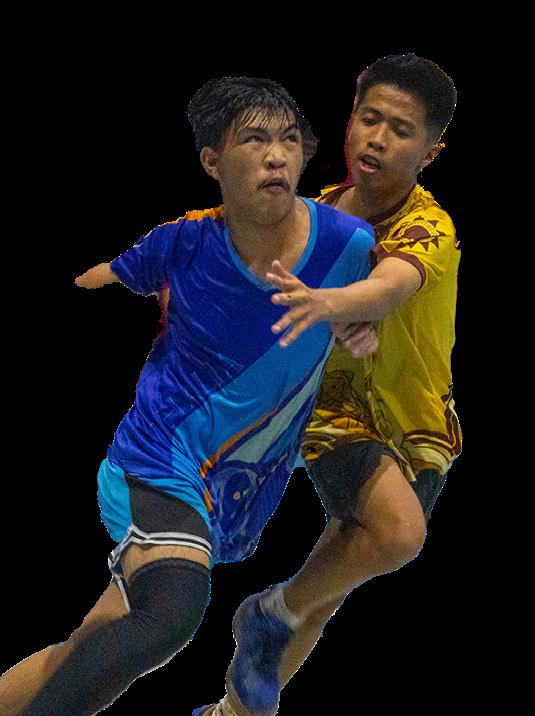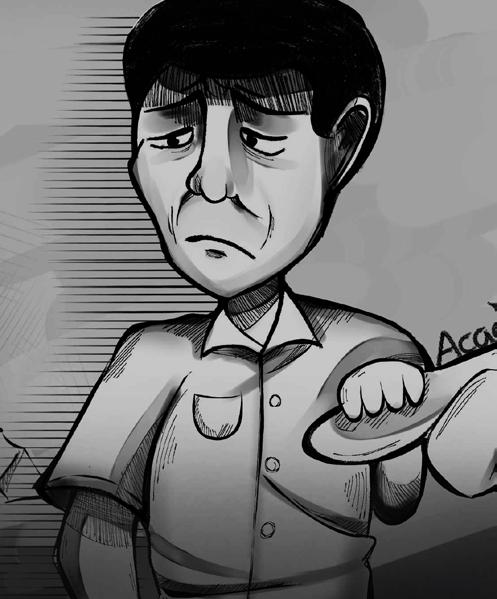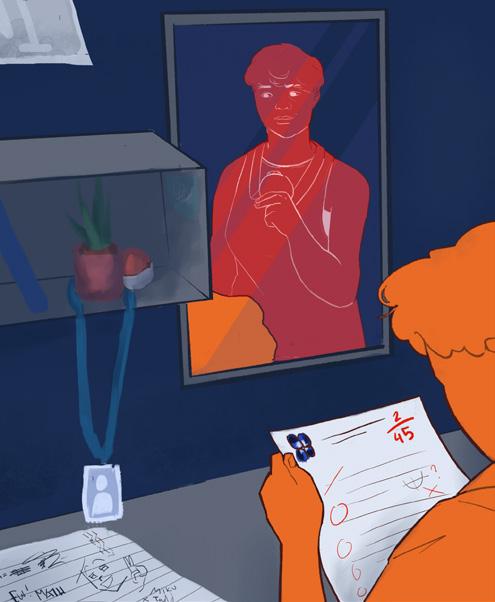


urges youth to use
Resolute Rhythm Bridge Over Troubled Water De Los Reyes bags top spot in int’l research
...We usually earn P1,000 a day but with this new ordinance, we might not even be able to pay for our boundary which is P700





urges youth to use
Resolute Rhythm Bridge Over Troubled Water De Los Reyes bags top spot in int’l research
...We usually earn P1,000 a day but with this new ordinance, we might not even be able to pay for our boundary which is P700

temporarily suspends LPTRP, re-allows Tacloban-Campetic route

Tacloban City Mayor Alfred Romualdez verbally suspended City Ordinance No. 2024-15-19 or the “Ordinance Adopting the Local Public Transport Route Plan (LPTRP) during an interview with K5 News FM Tacloban Digital on September 6.
This was after several complaints from commuters and operators were heard due to the removal of the Tacloban-Campetic route.
“I will suspend first the ordinance and coordinate closely with the Land Transportation Franchising and Regulatory Board (LTFRB) and other agencies,” he said.
According to him, the ordinance was suspended to help commuters, especially students, who are having a hard time commuting.
“At the moment, I’m suspending first the not allowing them until we straighten out with LTFRB so our students won’t have much problems,” he said.
In the interview, he also explained that the TaclobanCampetic route was removed from the city’s new route plan to maintain fairness among transport cooperatives from other municipalities.
“If we allow public utility vehicles (PUVs) to go to downtown, then we also need to allow those coming from Alangalang, Tolosa, and other municipalities. We can’t just exclusively say that we’ll only allow Palo. That’s why the LTFRB recommended that all PUVs coming outside of Tacloban should go to the terminal,” he said.
Scholars’ struggles
Prior to the suspension, commuters in Tacloban City and Palo experienced more difficulty in commuting on Thursday, September 5, as multicabs from Palo were no longer allowed to enter downtown.
According to a grade 12 student who lives in Brgy. 74 Nula-Tula, Tacloban City, he was surprised when the multicab he usually rides made the passengers get off at a different location far from the original one.
“Last night, I rode the multicab thinking that it would just be a normal day going home riding from Pisay to downtown, but when we reached GSIS, the driver told us to get off because apparently, they’re only allowed up to that point,” Grabrielle Cordeta said.
He also said that the commute was more hassle and expensive as he had to ride two multicabs instead of just one.
Meanwhile, another scholar also expressed the same concerns, saying that the sudden removal of the TaclobanCampetic route shocked him and cost him more than usual.
“I was shocked about the sudden change of their [Tacloban-Campetic multicabs] route because for me, I have a budget of 20 pesos per day for transportation, but on Thursday, I had to ride two multicabs home, which cost me 26 pesos,” Joshua Sudario from grade 12 said.
Driver’s opinions
In an interview with the Science Net, drivers from Campetic and Tacloban Drivers and Operators Transport Cooperative (CATADOTCO) expressed their thoughts on the new city ordinance.
One driver said that they knew about the removal of their route but didn’t know exactly when it would be implemented.
“We actually already knew about it but we didn’t know when it would be implemented because they [Tacloban City LGU] didn’t give us any document stating when they’ll actually stop us from entering downtown,” he said.


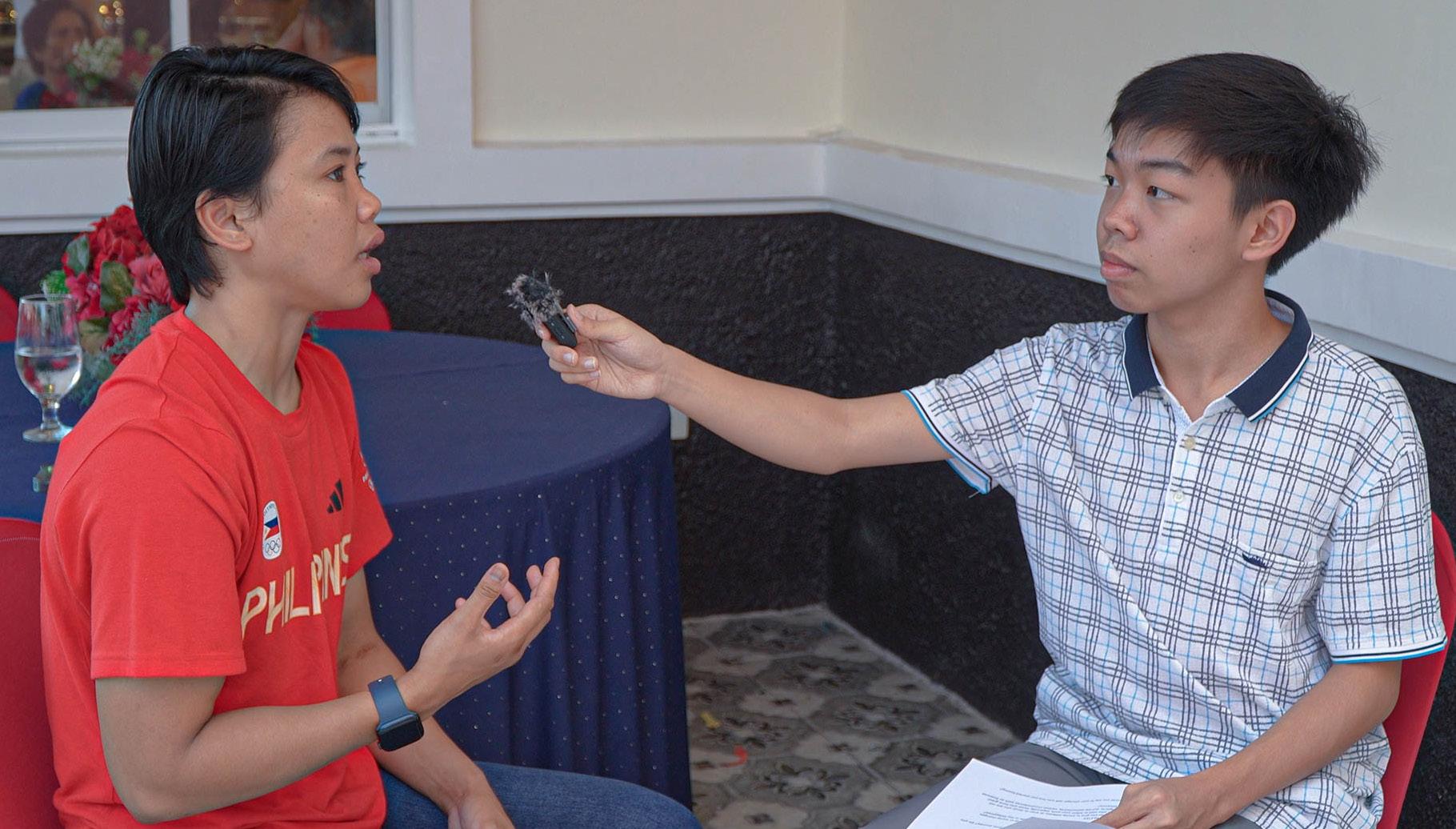



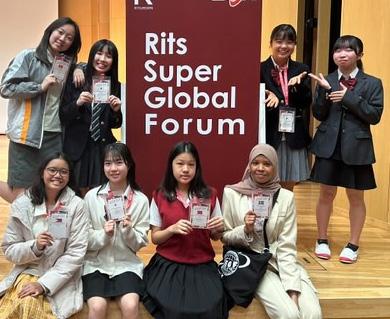

SAMANTHA MACABIT
To immerse themselves in discussions that tackle the theme “Regeneration: How Can We Create a Regenerative Society?”, four scholars from Philippine Science High School Eastern Visayas Campus (PSHS-EVC) collaborated with foreign students during the Ritsumeikan Super Global Forum (RSGF) 2024 held in Kyoto, Japan on November 13-17.




Paris Olympics 2024 Bronze Medalist Aira Villegas on August 23 urged the youth to manage with the resources they have in order to achieve their goals during an interview by The Science Net, the official English student publication of Philippine Science High SchoolEastern Visayas Campus.
“To all the youth, you do not really need lots of things. Be grateful for what you have, and then use the resources you have now to achieve what you want,” she said.
She further emphasized that lack of completeness and dissatisfaction are necessary in an athlete’s journey, highlighting its importance in keeping one’s motivation in sports.
“Sometimes, once you are an athlete and you are able to have everything, your drive will also be lost because you have everything. So it is like you will lose your motivation since everything you want is right there. So, sometimes it is really okay to lack something, so you can fill whatever it is you are lacking,” she said
The olympian then urged young athletes to avoid thinking of the income in sports, but rather treat it as a bonus that comes with their achievements.
“For me, I do not think of the
money. My mindset is ‘sports is so I can study.’ However, others have a different mindset like ‘sports will make me rich.’ Once you think of the money right away, you will not last long. Because the truth is, money is evil. It is just a bonus when it comes as a reward, just like me now,” Villegas said.
She also expressed her wishes for the government to pay more attention to sports as a whole, citing the media’s current focus on the “elite athletes” rather than the aspiring athletes.
“Right now, the attention seems to be focused on the elite athletes only. So, I hope the government looks at the aspiring athletes too since I also started from there,” she said.
Motivations
In the same interview, Villegas talked about her past and how she was inspired to start boxing despite her circumstances.
“I had nothing. So when I started boxing, my uniform, everything was borrowed. But the good thing is I used it as motivation,” she said.
When asked about the specific people who encouraged her to pursue boxing, she highlighted the role her family, mainly her brother, played in inspiring her and keeping her
motivation.
“Foremost is my family. Especially my brother because he taught me how to play boxing. Whenever I would see him, he would be boxing. He could go to school without asking for money from our parents through boxing. He also has a scholarship through boxing,” she said.
She also expressed her goal to further her career by winning a gold medal in future competitions.
“As an olympian, I still plan to get a gold medal. So this bronze, I am not saying that I’ve settled with it, but my goal in the Olympics is really to get that gold,” Villegas said.
Villegas then talked about how fame has not changed her attitude towards life, and that she is grateful for everything she has achieved so far.
“The good thing about me is that I’m still me. Nothing has changed. I know that fame and everything along with it is temporary. I always stay grounded and I look back to where I came from so I am just grateful for everything,” the olympian said.
Despite losing 5-0 to Turkish opponent Buse Naz Cakiroglu in the semifinals, Villegas managed to snatch a bronze victory— a historic first for the country in the sport.

VINCI TAMAYO
As stated in Wage Order RB VIII-24, the daily minimum wage is set to increase from P405 to P435 upon taking effect on December 2.
In the same wage order, household workers were also approved a P500 increase in their monthly salary, increasing the base salary of employees in the sector from P5,500 to P6,000.
According to the DOLE, the wage hike results in a 7% increase in the current
minimum daily wage of private sector workers which translates to a 10% increase in wage-related benefits, namely 13thmonth pay, service incentive leave (SIL), and social security benefits such as SSS, PhilHealth, and Pag-IBIG.
Upon implementation of the wage order, approximately 126,095 private sector minimum wage earners and 57,080 domestic workers are expected to benefit from the wage increase.
According to DOLE Secretary Bienvenido Laguesma, only 10 of the 16 RTWPBs in the nation—namely the RTWPBs of National Capital Region (NCR), Regions 1 (Ilocos), 2 (Cagayan Valley), 3 (Central Luzon), 4-A (Calabarzon), 6 (Western Visayas), 7 (Central Visayas), 8 (Eastern Visayas), 9 (Zamboanga Peninsula), and 12 (Soccksargen)—have granted minimum wage increases for private workers as of December 3.
Danielle Anos, Clara Canta, and Samuelle Jagonio of Grade 10 and Amanda Noel of Grade 9, accompanied by Ms. Darry Portillo, represented PSHS-EVC as one of the participating schools from the Philippines.
In an interview, Sakura Ohashi, Grade 11 Ritsumeikan High School student and RSGF participant, said that the event allowed her to realize the depth of global issues and appreciate the bond she’s forged with the other students.
“Even though this may be our first and last time meeting, it’s a special connection that I certainly want to cherish,” she said.
She further emphasized how interacting with foreign students allowed her to discover cultures she’s never heard of before.
With 16 participating schools from Cambodia, Canada, Hong Kong, India, Jordan, Singapore, Sweden, Taiwan, Thailand, Philippines, United Kingdom, United States of America, and Japan, RSGF participants underwent a five-day program filled with discussions about regeneration and cultural activities.
Even though this may be our first and last time meeting, it’s a special connection that I certainly want to cherish
According to the Regional Tripartite Wages and Productivity Board (RTWPB), the wage order is expected to directly benefit
126,095
minimum wage earners.
175,639
full-time wage and salary workers earning above the minimum wage benefit because of upward adjustments at the enterprise level arising from the correction of wage distortion.



60% of scholars not looking forward to 2025 polls


scholars are not looking forward to the upcoming 2025 elections. out of
Six out of ten Philippine Science High School - Eastern Visayas Campus (PSHS-EVC) scholars expressed that they are not optimistic about the upcoming 2025 senatorial elections, citing several experiences from previous elections.
The said results were based on a survey conducted by The Science Net, the official English school publication of PSHS-EVC, on December 26.
A grade 12 student expressed that she does not have much optimism since voters can’t help but make the same mistakes they’ve been doing in the past elections.
“No, I want to say I’m hopeful about it because it’s another chance to elect officers who truly have the credentials and capability to make changes in this country, but



It was also hailed as one of the top 9 best creative Christmas trees in Southeast Asia by ASIAN Sea Story, a Facebook page known for recognizing diverse cultures of Southeast Asia.
Juliana Waniwan, a visitor from Eastern Samar, expressed how she is not surprised that the tree gained recognition as the best in the country, considering its uniqueness and symbolism.
“I think the reason why people are amazed by the bamboo Christmas tree is because of its uniqueness and creativity. It’s truly something most of us haven’t seen before, and its symbolism makes it even more special. I personally wouldn’t wonder why it’s considered the best in the country,” she said.
Unlike the other Christmas trees in Philippines, the Palo Christmas tree stands out as it was crafted entirely from bamboo, symbolizing the town’s survival and resilience after the 2013 Super Typhoon Yolanda, as bamboos were one of the few things left standing after the typhoon’s onslaught.
Meanwhile, Sofia Reyes, a local

given the outcome of the last few elections and how voters just can’t help but make the same mistakes they’ve been doing for years, I don’t have much optimism that this year will be any different,” Alyzzandra Mendoza said..
Meanwhile, another scholar stated that the upcoming elections can be compared to the 2022 elections where name recognition was prioritized over credentials.
“It brings back similar emotions to the 2022 elections where name recognition was prioritized much


more by the electorate rather than credentials and policy,” Zachary Tan, a grade 11 student, said.
This was supported by another learner who also said that she is not that optimistic considering that the ones who would be running are connected to the current administration.
“It’s already expected that the ones who would be running at this point in time are allies, friends, or even family members of the current administration. There would be no opposition,” Sachi Adricula from
grade 12 said.
On the contrary, Samantha Romero from grade 7 believes that there is room for optimism due to the youth’s growing political awareness and the role of social media in fact-checking candidates.
According to the final list of senatorial candidates released by the Commission on Elections, a total of 66 candidates will be running in the upcoming 2025 senatorial elections.
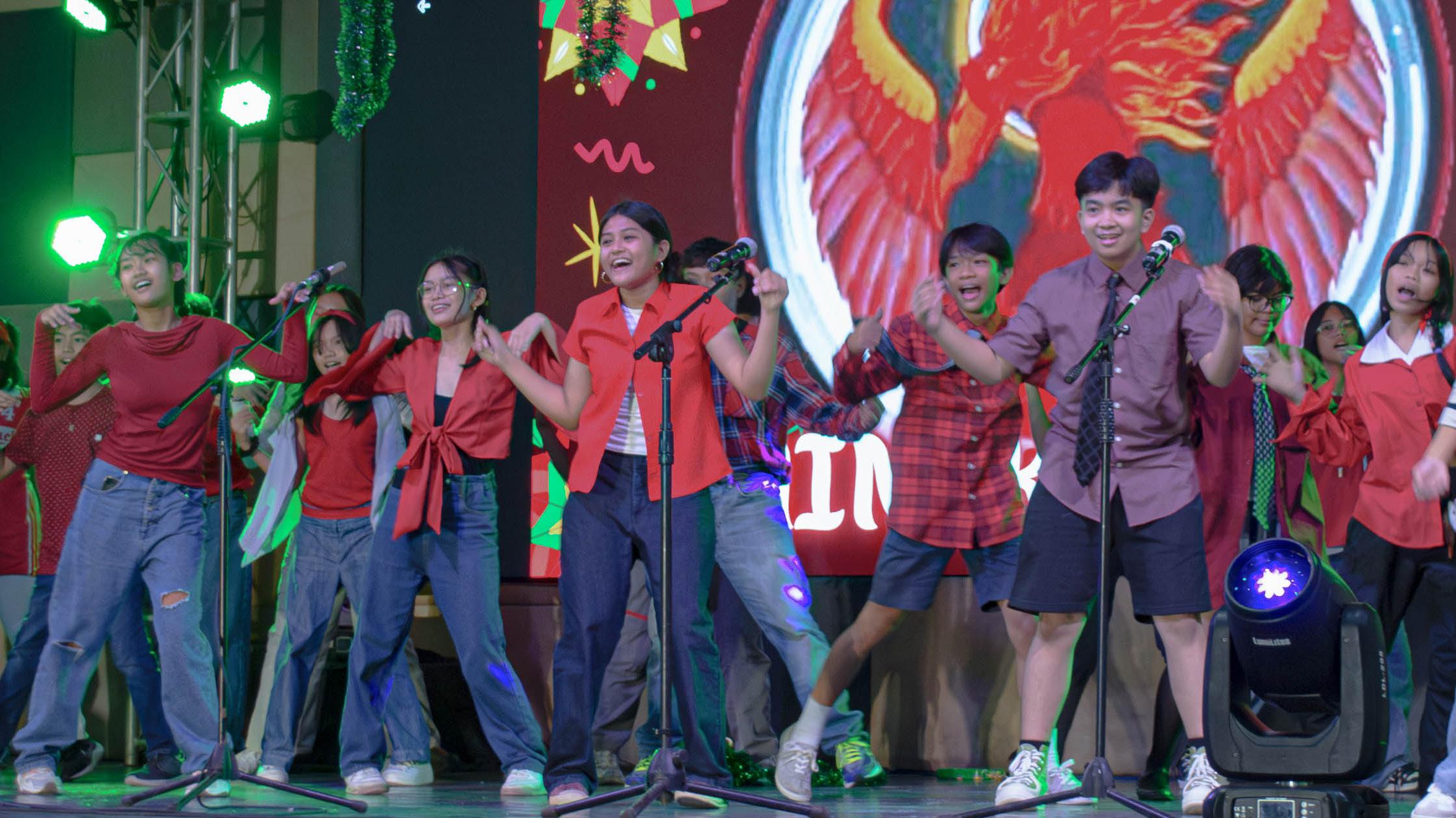
culture, creativity, and resilience” she said.
Palo Municipal Mayor Remedios “Matin” Petilla conceptualized the Christmas tree and envisioned it as a symbol of the town’s resilience and commitment to sustainable development.
This achievement highlighted Palo’s ability to combine tradition and innovation, earning both national and international recognition and bringing pride to the Philippines.

Science High School - Eastern Visayas Campus (PSHS-EVC) celebrated Paskorus 2024 with the theme
“Maribhong, Marisyo, Malamrag” at the PSHS-EVC gymnasium on December 19, providing students with the opportunity to showcase their performances and the many hours they had spent practicing for the different contests.
This year’s Paskorus was divided into several contests: Straight Singing and Choreographed Singing for Category A of Grade 7 and 8 and Category B of Grade 9 and 10, and a Musical Play for Category C of Grade 11 and 12.
The students, grouped into House X (Minokawa), House Y (Bakunawa), and House Z (Arimaonga), showed the result of their hard work through their performances.
In Straight Singing Category A, House Arimaonga took first place, House Minokawa took second, and House Bakunawa won third. For Straight Singing Category B, House





Arimaonga won first place, while Houses Minokawa and Bakunawa placed second and third, respectively.
In Choreographed Singing Category A, House Minokawa took first place, House Arimaonga won second, and House Bakunawa came third. For Choreographed Singing Category B, House Arimaonga won first place, while Houses Minokawa and Bakunawa, took second and third place, respectively.
Meanwhile, in the Musical Play, House Arimaonga won first, followed by House Minokawa in second, and House Bakunawa in third.
In an interview, Samantha Romero, a member of House
“The problem with the implementation is that they didn’t give the public enough information so people, especially students, could prepare,” he added.
On the other hand, another driver said how the LPTRP could severely affect their livelihood, causing them to lose almost half of their daily income.
“We usually earn P1,000 a day but with this new ordinance, we might not even be able to pay for our boundary which is P700,” he said.
Meanwhile, both drivers expressed their gratitude towards Romualdez for temporarily suspending the city ordinance and allowing them to go to downtown again but also hoped for the mayor to reconsider and not remove their route permanently.
City Ordinance No. 2024-15-19 or “Ordinance Adopting the LPTRP” of Tacloban City is an ordinance approved on August 6 which aims to improve road safety and public transport travel time and quality, but left commuters and multicab drivers confused due to the absence of the Tacloban-Campetic route.
Minokawa, the first placer in Choreographed Singing Category A, shared how memorable her first Paskorus was.
“As a freshie, being part of this year’s Paskorus competition was such a memorable experience. Winning with the team made it even more special, and I’m so grateful for the support of our seniors. Their guidance brought out the best in us,” Romero said.
Paskorus is an annual event of PSHS-EVC meant to spread holiday cheer and showcase the talents of scholars.
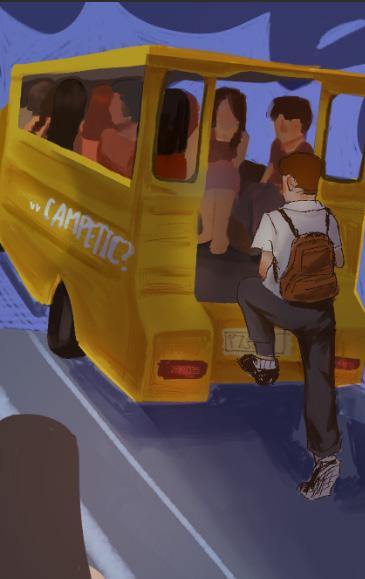


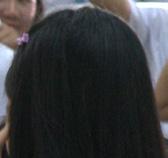




To show appreciation for the hard work of its employees, Philippine Science High School - Eastern Visayas Campus (PSHS-EVC) held Pagbati 2024 in the campus gymnasium on October 7, 2024.
The event, headed by the Student Alliance (SA), served as the school’s official culminating activity for National Teachers’ Day. The activity was not limited only to the teaching staff but also included other employees.
Pagbati 2024 formally kicked off with an opening message by PSHSEVC’s SA President Clarence Jude Tabinas.
In his message, Tabinas expressed his thanks to the various employees of PSHS-EVC, saying that the program was meant to show the appreciation of the student body for them.
“Together, each and every one of you plays a vital role in our stay in Pisay, making it so much more memorable,” he said. “Today, we, the student body, would like to show our heartfelt appreciation through this program, prepared especially for you,” he added.
The PSHS-EVC community tribute followed shortly in the form of a video showcasing the dedication and commitment of the employees to their work. Afterward, Pisayaw, the official dance troupe of the campus, presented a performance as their way of showing thanks to the employees.
The event then culminated with the gift-giving ceremony and was formally concluded with a song performance by PSHS-EVC’s very own student choir, Musikanta.
Pagbati 2024 was held to highlight the efforts and contributions of the school’s faculty and staff and to show the gratitude of the student body for their services.

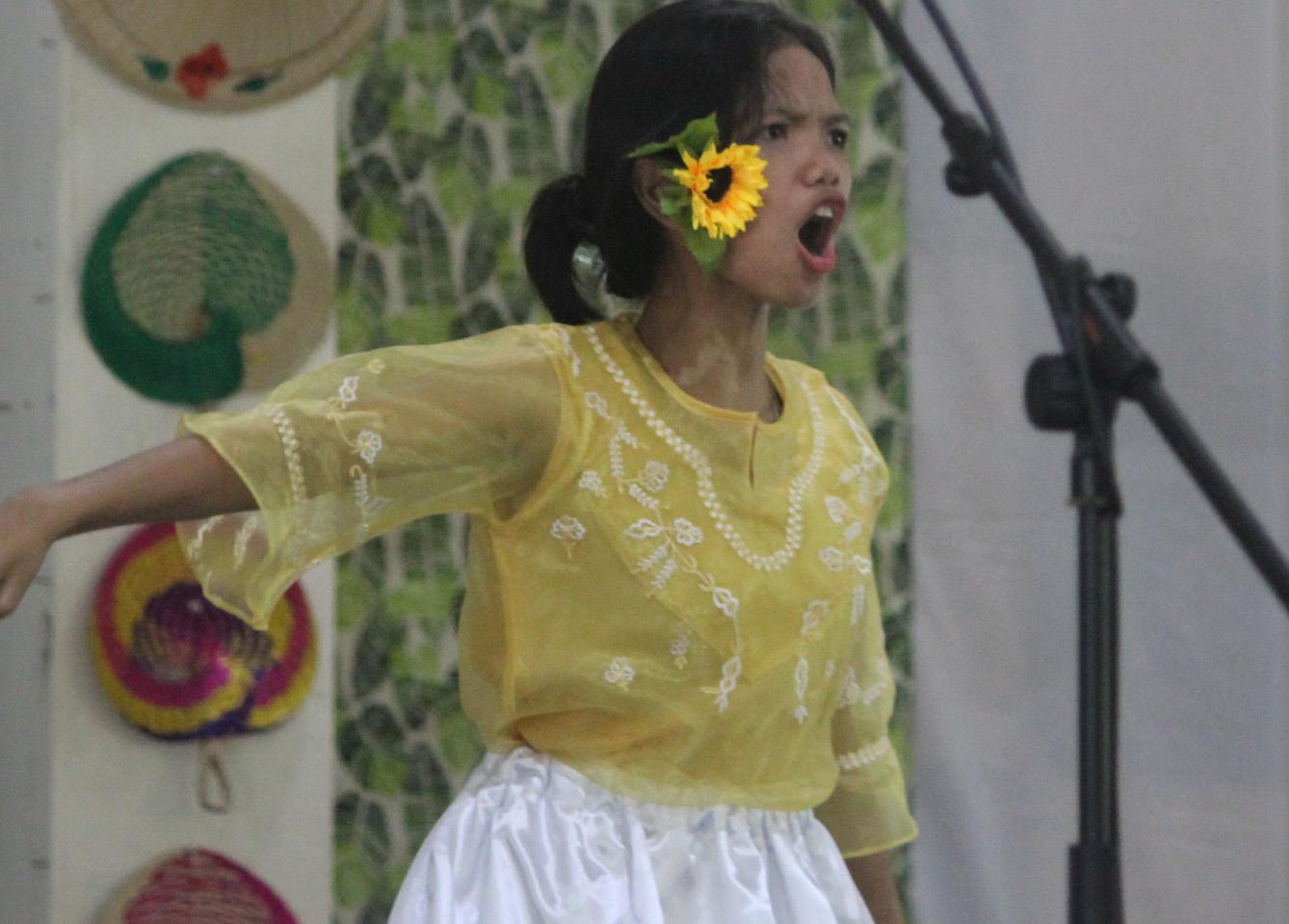

To celebrate the annual Buwan ng Wikang Pambansa, Philippine Science High School - Eastern Visayas Campus (PSHS-EVC), through the Filipino Unit, held a culminating activity in the campus gymnasium on the afternoon of August 30, 2024, where students and faculty members dressed in traditional Filipino attires.
The event kicked off with an opening prayer and the singing of the national anthem which was followed by an opening message by the Curriculum Instruction Division Chief Leslie C. Cruto.
Afterwards, the competitions for each grade category were held - Tinig Pisay for Grade 7 and 8, Pagawa ng Salaysay for Grade 9, Masining na Pagbasa for Grade 10, and Panulaang Pisay for Grades 11 and 12.
Tinig Pisay, a vocal solo singing contest, showcased the talents of Grades 7 and 8 representatives. Febby Cadalso from Grade 7Ruby took third place with her version of “Lipad ng Pangarap” by Angeline Quinto and Regine Velasquez, Kaela Yuse from Grade 7 - Diamond won second place with the song “Kahit Ayaw mo na” by This Band, while Cleofe Zoe Lorein Go from Grade 8 - Camia took first place with her rendition of “AMAKABOGERA” by Maymay Entrata.
In line with this year’s theme of “Filipino: Wikang Mapagpalaya,” selected Grade 11 and 12 students shared their original poems during Panulaang Pisay. Casei Claire Advincula from Grade 12 - B won third place, John Andelle Molabola from Grade 11 - B clinched the second spot, while Lourdyz Yzabelle Renomeron of Grade 11 - C won first place with her poem that described the unity and connection among Filipinos that were made possible by the national language.
“Winning was a bonus, but performing meant a lot to me. It was my first time to be on stage speaking,
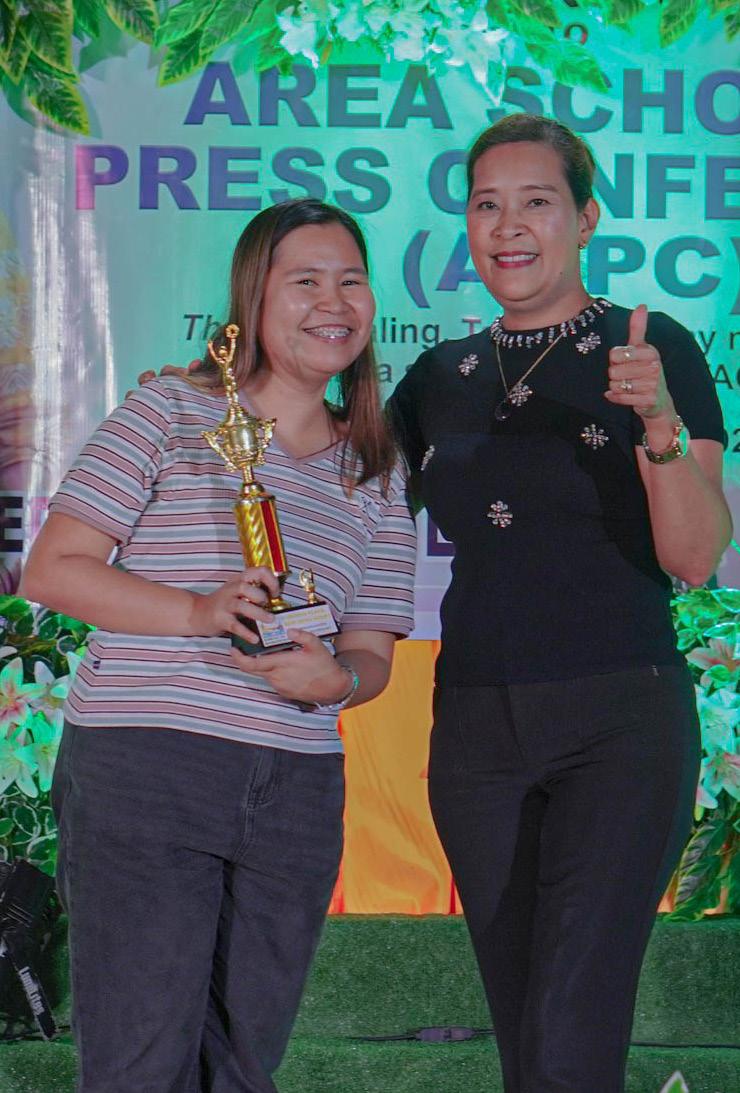

Tree lighting serves as beacon of hopeTabinas

CEAN JHEE FLORES
“Just as how this tree lights up the campus, I hope it also serves as a beacon of hope for everyone here in the Pisay”.
This was the main message said by Student Alliance President Clarence Jude B. Tabinas after the recently held Christmas Tree Lighting on November 22.
Tabinas expressed his gratitude to the whole Pisay community for their participation and for making the event a success.
“I am very thankful to everyone, especially to the SA, both the executive and sitting councils, for making this event possible. It would not have been a success without everyone’s cooperation,” he said.
He also highlighted that Christmas is an event about “love and togetherness” and can be celebrated in any way.
and I was able to overcome my stage fright. It definitely boosted my confidence a little bit,” Renomeron said.
In the Paggawa ng Sanaysay competition, representatives from each Grade 9 section showcased their talent in writing. Jaryn Avelino from Grade 9Potassium won third place, Vianna Alexei Llevado of Grade 9 - Sodium won second place, while Anthony Jazz Obrique from Grade 9 - Rubidium won first place.
The last round of presentations was from the Grade 10 students who competed with each other in Masining na Pagbasa, a speech choir competition. The class of Grade 10 - Electron won first place, with Grade 10 - Neutron and Grade 10 - Proton winning second and third, respectively
“The competition not only gave us, students, a chance to showcase our creative talents, but it also gave me and my classmates a chance to form a closer bond with each other, a chance to deepen our friendship and promote camaraderie,” Danielle Anos from 10 - Electron said.
Filipino Unit Head Vesifina M. Ron then closed the program with a speech commemorating the national language and the purpose that it serves.
“Ang wika natin ang naging daluyan ng ating mga damdamin, adhikain at mga pangarap, isang wikang tunay mapagpalaya [Our language served as the medium for our feelings, aspirations, and dreams, a language that is truly liberating], ” Mrs. Ron said.
The Buwan ng Wikang Pambansa, simply known as the Buwan ng Wika, is a month-long celebration every August to appreciate and promote the Filipino language.
“For me, Christmas is all about love and togetherness. What really makes Christmas special is that it’s an event that has the power to bring people together after a year full of challenges,” he said.
Approximately 650 Philippine Science High School - Eastern Visayas Campus (PSHS-EVC) students, faculty, and staff celebrated the spirit and joy of Christmas through this recently conducted event.
For me, Christmas is all about love and togetherness.

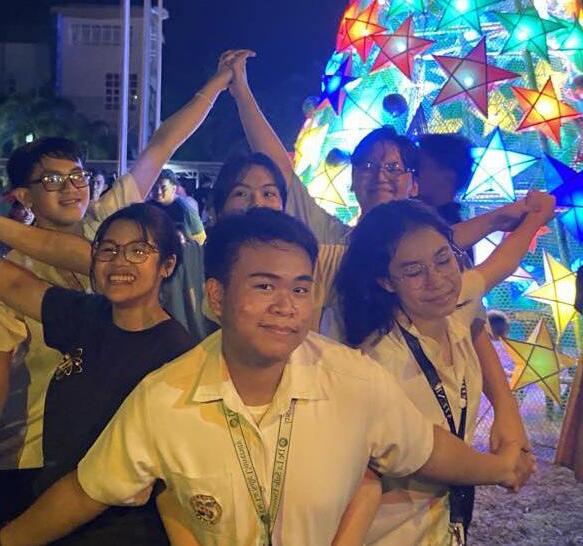
Pisay-EVC hailed ‘best performing secondary school’ in area confab

SAMANTHA MACABIT
After garnering multiple awards in the individual and group categories, Philippine Science High School - Eastern Visayas Campus (PSHS-EVC) was hailed as the best performing secondary school during the recently concluded Area Schools Press Conference (ASPC) 2024 held on December 16-17 at Palo, Leyte.
Remalyn Tomol, adviser of PSHS-EVC’s official English publication—The Science Net, expressed how the result did not surprise her and that the award validates the capabilities of PSHS-
EVC scholars.
“Looking back at how our individual and group contestants performed, it is not surprising that we received this recognition. This is, in fact, a validation of what our student-journalists can do,” she said.
Scholars of The Science Net bagged the following awards in the individual categories: Clarence Jude Tabinas took home 1st place for News Writing, Lilianne Salorio gained 2nd place for Editorial Cartooning, while Lianna Lopez, Xavi Solis, and Poimen Agnila gained 3rd place in Feature Writing,
Sports Writing, and Column Writing respectively.
Meanwhile, members of Online Publishing—Ashkinaz Canonoy, Zenas Agnila, Zachary Tan, Samantha Macabit, and Samantha Romero—won 1st place and Collaborative Desktop Publishing— Josh Aseo, Danielle Anos, Fionna Canales, Alyzzandra Mendoza, Kyle Nase, and Zoe Quibranza—garnered 3rd place.
Furthermore, in an interview, Bryle Lacabe, Editorial-in-Chief of An Pukot, the campus’ official Filipino publication, emphasized how being in a science high school has made it hard to have coaches who actually specialize in journalism.
“The award we received is certainly a testament to what us scholars can do, however, the challenge of being in a school that mainly specializes in the Science, Technology, Engineering, and Mathematics track is the lack of coaches with proper training in journalism,” he said.
Journalists under An Pukot also garnered awards in the individual Filipino categories, Bryle Lacabe won 1st place in Column Writing, Matt Tinsay and Jian Cristino got 5th for Feature Writing and Sports Writing, respectively, and Lena Mendoza got 7th for Editorial Cartooning.



House Bill No. 9726 or the proposed Expanded Philippine Science High School System (PSHSS) Act was approved by the House of Representatives on its third and final reading on February 7, where a total of 215 lawmakers voted to approve the bill, with no one voting against it or abstaining.
The bill’s main objective is the establishment of two campuses per region with only one campus per province.
According to the bill, the possible locations of the new campuses are as follow: First District of Aklan; Daraga, Albay; Ubay, Bohol; Laoag City, Ilocos Norte; Labangan, Zamboanga del Sur; Third District of Cagayan; General Santos City; South Cotabato; and Malaybalay City, Bukidnon.
Aklan 1st District and Chair of Committee on Science and Technology Representative Carlito Marquez, the sponsor of the bill, said it would elevate science and technology education in the country.
“Pisay is well on its way to achieving its mission and vision in pursuit of truth, passion for excellence, and commitment to service. Through the advancement of this measure,
SCINET ASKS
our hopes to elevate Science and Technology education will now come into fruition,” said Marques on a Facebook post.
House Speaker Ferdinand Martin Romualdez also highlighted that the bill aims to accommodate more government scholars and make worldclass education more accessible for Filipinos.
““The bill will not just improve the management of PSHS but also accommodate more government scholars, and increase the access to quality, free and globally competitive education for the country’s science, technology and innovation manpower,” he said.
Currently, the PSHSS has 16 campuses all over the country, providing quality STEM education to young Filipino students.
Through the advancement of this measure, our hopes to elevate Science and Technology education will now come into fruition


BY CLAIRE OREJOLA & CLARENCE TABINAS
General Parents-Teachers Association (GPTA) Presiden Dr. Mary Grace Tan-Uy expressed the full support and partnership of the GPTA to Philippine Science High School - Eastern Visayas Campus (GPTA) in molding the scholars during the annual Family Day on November 9.
General Parents-Teachers Association (GPTA) Presiden Dr. Mary Grace TanUy expressed the full support and partnership of the GPTA to Philippine Science High School - Eastern Visayas Campus (GPTA) in molding the scholars during the annual Family Day on November 9.
“From this point, allow us from the GPTA to once more express our full support and partnership with the school in molding our children into what God has intended them to be,” Tan-Uy said.
The morning events of this year’s family day was held at PSHS-EVC which featured various games such as the Amazing Pisay Treasure Hunt at the students’ lounge and the basketball and volleyball matches between parents, students, faculty, and staff at the school gymnasium.
Meanwhile, the afternoon program was held at the Leyte Academic Center (LAC) where parents from the different batches showcased their performances for the cheerdance competition.
Furthermore, a video tribute for the graduating batch was also played to celebrate their achievements and contributions to the school.
The event concluded with a dance party, where everyone danced and celebrated before officially ending the program.

In a survey conducted by The Science Net, 16 out of 20 Philippine Science High School - Eastern Visayas Campus (PSHS-EVC) scholars opposed the bill that aims to expand the PSHS System, citing reasons such as the lack of resources and need for further development of existing campuses. Meanwhile, four were in favor, highlighting the inaccessibility of pre-existing campuses to those from geographically isolated areas.




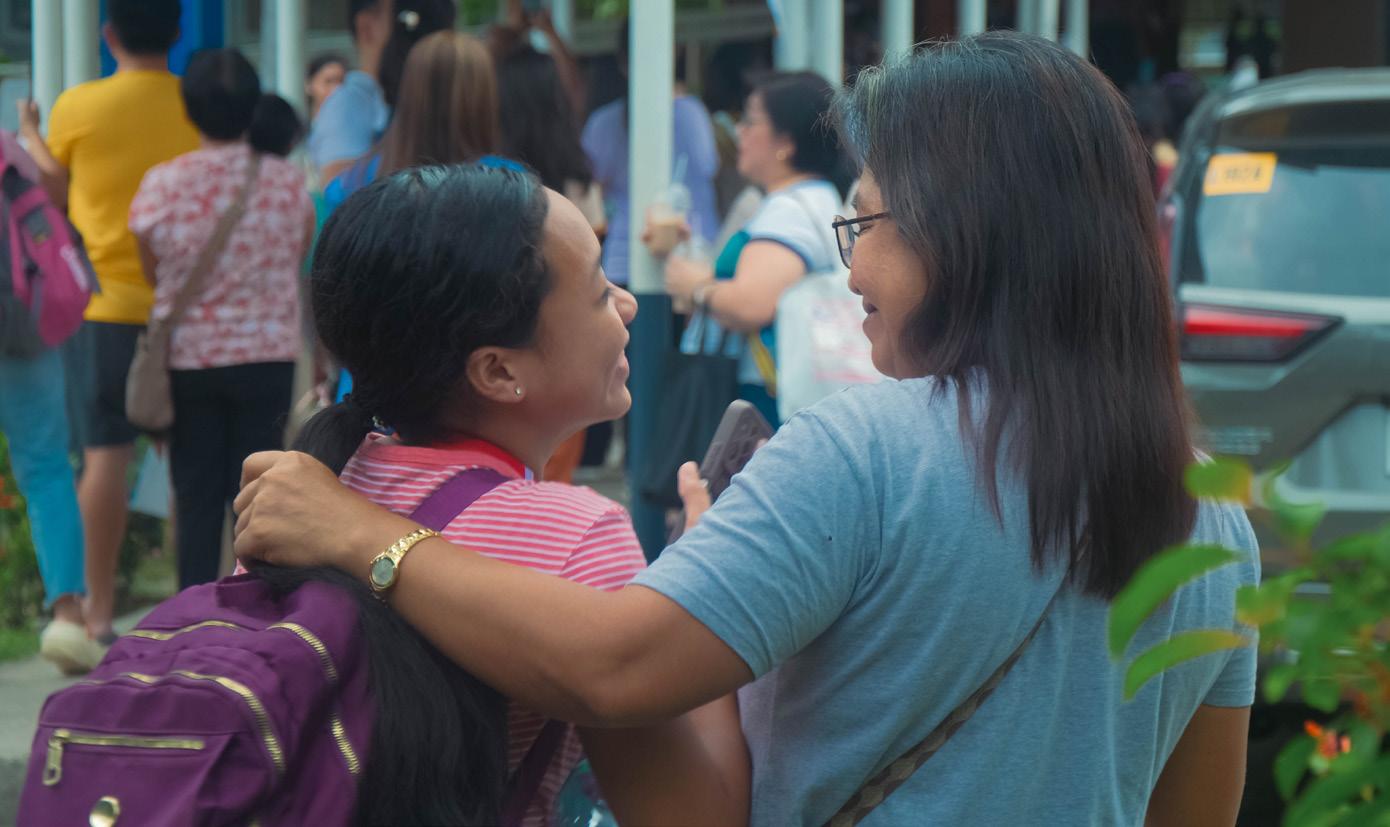
P31,000 studes vie for Pisay

hilippine Science High School - Eastern Visayas Campus (PSHS-EVC) scholar Poimen Deb Agnila received a merit award in the Immerse Education Essay Competition held online on February 23, September 12, and October 17, besting thousands of applicants across the globe.
In an interview, Agnila shared that in her essay, she highlighted the importance of chemistry education and how it can be used in day-to-day activities.
“I wrote about the importance of chemistry education in the Philippines. I tried to contextualize chemistry based on how we use our knowledge about it in everyday tasks such as cooking and washing clothes,” she said.
Furthermore, she explained how the Philippines, as a society, could be empowered if Filipinos were given the chance at chemistry education.
certainly Meanwhile, for the group Filipino categories, members of Online Publishing—Fionna Macalalag, Hannah Bel Daria, Jaryn Avelino, Raniel Hermosilla, and Quin Abalos won 1st place while Collaborative Desktop Publishing—Reese Casas, Joshua Sudario, Lakambini Hoo, Sebastian Siega, Olyssa Guial, and Charles Mendoza garnered 3rd place.
Additionally, Alisto Radyo, An Pukot’s Radio Broadcasting and Script Writing team bagged multiple special awards where Jyviere Yepez and Iris Gullemas were recognized as the best Male and Female anchors, respectively, and Gabrielle Cordeta as 2nd Best
“I argued that if Filipinos could be given the chance to understand simple chemistry and how it relates to us being able to function as humans, then the Philippines, as a society, could be empowered to improve,” she said.
She also advised aspiring contestants to take a leap of faith and join contests even if they are not too confident. Agnila is eligible to receive one of the following awards: a £1000 award towards residential programs, a £500 award for an Online Research Program, or a £250 award for a Group Online Research Program.
News Presenter. The team was also awarded with Best Infomercial. With the theme “Campus journalism in the MATATAG Era: Breaking Down Barriers of Isolation, Indifference, and Mediocrity: Building Up Support for Inclusion, Collaboration, and Excellence”, the ASPC aimed to identify The Top 5 of the individual categories and Top 3 of the group categories who will represent Area 1 in the upcoming Division Schools Press Conference in Bato, Leyte.
This is, in fact, a validation of what our studentjournalists can do.
To vie for a spot in the Department of Science and TechnologyPhilippine Science High School System (DOST-PSHS), over 31,000 grade 6 students nationwide gathered on PSHS campuses and test centers throughout the Philippines to take the National Competitive Exam (NCE) on November 16 and November 23.
When asked for his reason in taking the NCE, Kieth Nathan L. Garces, a student from Sto. Niño SPED Center highlighted the numerous benefits of studying in Pisay.
“There’s a lot of benefits to Pisay like the stipend and the well-kept facilities. It’s just in general a good school,” he said.
Meanwhile, Mary Advincula Trippie Samson, mother of NCE taker Sophie Alexei Samson and current PSHS student Althea Samson, noted down her reasons for encouraging her daughters to study in PSHS and what she hopes they can achieve there in an interview last November 23.
31,636
“As a parent, I of course want the best education for my children,” she said. “I want my daughters to choose their passion and to chase their dreams, and I will make sure to always support them throughout,” she added.
The NCE is an annual admission test hosted by the PSHSS to determine the students eligible for entry to its 16 campuses. According to the PSHSS, only 1,860 slots will be available.
Eligible Applicants must also have a final grade of 85 in science and mathematics or be in the top 10% of their class while not having any pending immigrant applications to any foreign countries.


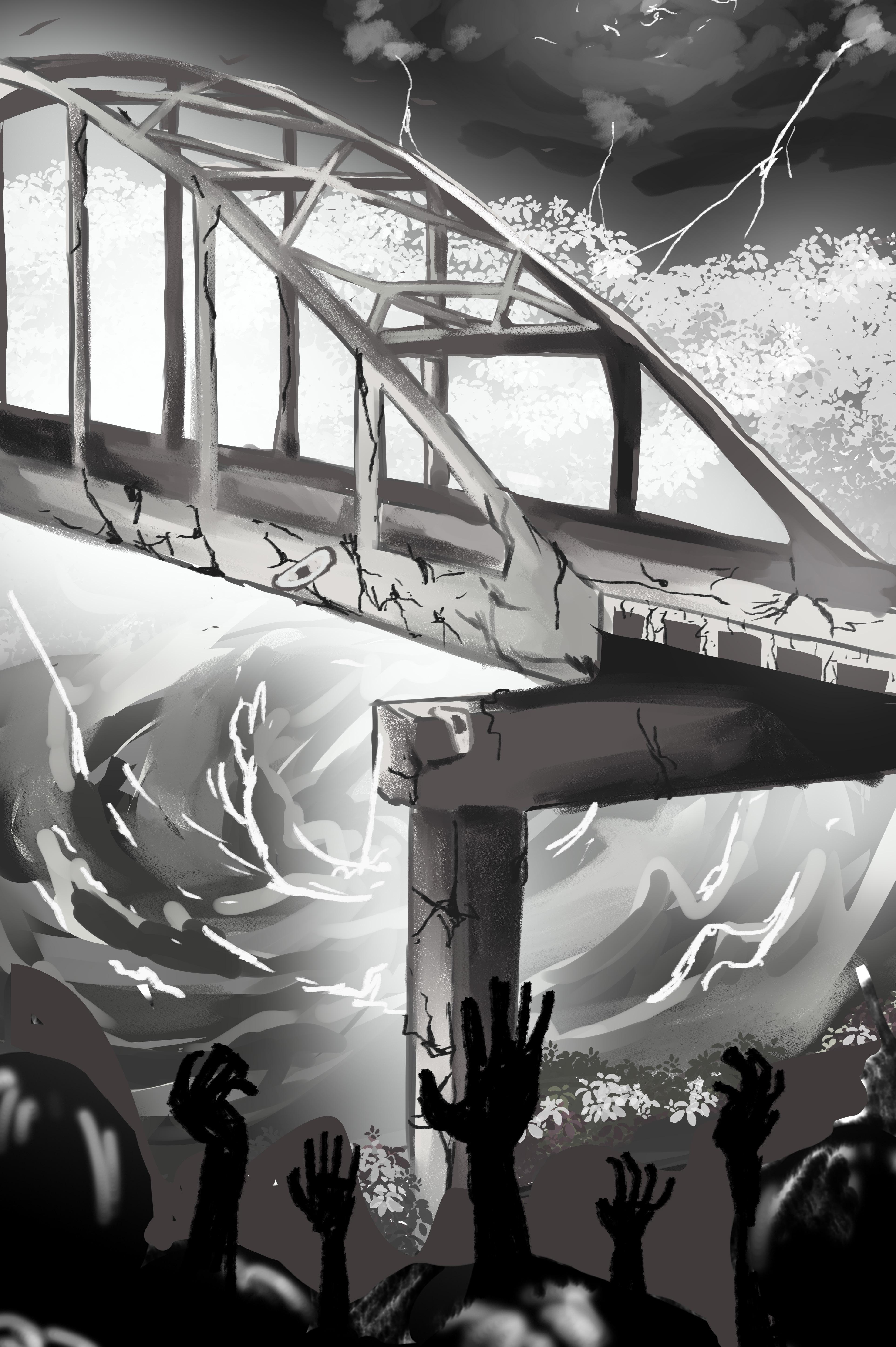

Biliran Bridge, the 48 year old structure that is critical in connecting the province of Biliran and the mainland of Leyte, was reported recently to show defects, eventually closed to heavy vehicles for its risks in collapsing mid-drive. This triggered Biliran to declare a state of calamity as their connecting road to the mainland faces potential closure. The shutdown would severely disrupt the transport of goods, services, and people, isolating the province and impacting its economy and daily life.
This sudden declaration of a state of calamity has sent shockwaves through Eastern Visayas, highlighting the province’s ongoing struggle against extreme natural phenomenon. Yet, beyond the immediate need for relief, this crisis demands a deeper discussion about preparedness, accountability, and sustainable recovery.
This small province, blessed with natural beauty and rich resources, is repeatedly battered by storms, floods, and landslides. With other external factors such as time and multiple heavy loads crossing it, the wearing down of the bridge was an event expected to happen, just not so soon. These disasters have not only disrupted lives but also exposed systemic weaknesses in governance, environmental management, and community readiness. Biliran’s predicament is not unique—it reflects vulnerabilities shared by many Philippine provinces.
The state of calamity is
a necessary move, unlocking emergency funds and enabling immediate aid with prompt action from the head engineers.
However, it is not a solution in itself. The real question is whether this declaration will lead to long-term change or simply become another cycle of reactive governance.
Over time, deforestation and poor waste management have weakened natural defenses against flooding and landslides. Informal settlements and unregulated construction in high-risk areas further expose communities to danger. At the same time, the climate crisis continues to escalate the intensity of natural disasters, making mitigation and adaptation more urgent than ever.
Local governments bear the heavy responsibility to act decisively. Environmental protection must become a priority, from reforestation initiatives to strict enforcement of zoning laws. Disaster risk reduction
strategies should include early warning systems, community training, and investment in resilient infrastructure. Yet, this is not solely a task for officials— communities must actively participate in these efforts, equipped with knowledge and resources to safeguard their own futures.
Science and education also contribute meaningfully to the solution, whether through research, advocacy, or direct community engagement, especially by innovative solutions like finding better construction alternatives, promoting awareness in the issues of climate change, and ensuring that the voices of the youth are heard in shaping policies that impact the future.
The calamity in Biliran is a wake-up call. Let it not be just another headline to fade with time but a rallying cry for action and accountability. Biliran’s resilience lies not only in recovery but also in preventing the next disaster from becoming another tragedy.
Biliran’s resilience lies not only in recovery but also in preventing the next disaster from becoming another tragedy.




RAZOR SHARP
ZOE QUIBRANZA
t seems America has found its latest Robin Hood in the form of Ivy League graduate-turned CEO shooter Luigi Mangione, after he was identified as the prime suspect in the murder of UnitedHealthcare chief executive Brian Thompson. His alleged motive: an intense loathing for the corporate scheme that is American medical care. Meanwhile, around 14,000 kilometers away, the Philippines is facing healthcare problems of its own, and it seems only a matter of time before the country finds itself with an outlawed hero and the death of an oligarch.
At the heart of the Philippine healthcare system is an insurance giant, the Philippine Health Insurance Corporation, colloquially known as PhilHealth. It has quickly grown into ubiquity and, apparently, into a household necessity as well. Every Filipino worker has three things of great significance that they like to keep snugly in their wallets: some cash, an extra ID, and a PhilHealth card. Obviously, when your population has grown dependent on a particular service, the next course of action as a lawmaker is to improve said service. However, it seems that the current state of the country’s public health program suggests that our lawmakers have, once again, succumbed to ignorance. Amid allegations of fraud, ghost patients, and unused funds, the government has resorted to the only feasible solution: sabotaging the Philippines’ universal healthcare project. It’s become painfully obvious that the rich are never a concern. They never have trouble paying for lavish surgeries, much less for a thousandpeso medical bill. But, to the Filipino populace, a PhilHealth benefit is as valuable as health itself. Recently, the bicameral body approved the budget for the year 2025, and it looks as terrible as ever.


SAdding to the Department of Finance’s attempt to deduct 89.9 billion pesos worth of unused funds from PhilHealth, the state-owned insurance company is being threatened with a budget of no more than zero pesos for the next 12 months. Yes, you read that right—the lawmakers have concluded that they must cut off PhilHealth entirely from the national treasury. Before I get ahead of myself, I must first state the main problems of Philippine insurance. To begin with, there is the issue of financial mismanagement and corruption, which allegedly cost the corporation billions in 2020. Then, there’s the inefficient claims processing system, resulting in delays in reimbursements for services rendered to PhilHealth members. The administration’s move to fund itself with money from government institutions is nothing but politics. It is hypocritical to fund their projects with resources they themselves disregarded in the 2024 budget.
When will those at the top realize that fixing PhilHealth is never synonymous with taking its money?
Returning to the Robin Hood persona of the US, it’s high time to question when others will follow suit. We must realize that Mangione’s strike was against a private institution, so what would a strike at a state-owned one mean? It is easy to point fingers, but when all are gesturing at the powers that be, it becomes simply difficult to tell whose heads will roll.

ex education has long been a battleground between progress and conservatism, but the latest debate over Senate Bill No. 1979, or the Prevention of Adolescent Pregnancy Act, has turned into an all-out war of rhetoric. The bill, which seeks to institutionalize comprehensive sexuality education (CSE) in schools, aims to equip young Filipinos with medically accurate and culturally sensitive information on reproductive health, disease prevention, and responsible decision-making. However, instead of fostering informed discussions, it has ignited a political firestorm, with President Ferdinand Marcos Jr. at the helm of the opposition, fanning the flames of misinformation and moral panic.
At the heart of the Philippine healthcare system is an insurance giant, the Philippine Health Insurance Corporation, colloquially known as PhilHealth. It has quickly grown into ubiquity and, apparently, into a household necessity as well. Every Filipino worker has three things of great significance that they like to keep snugly in their wallets: some cash, an extra ID, and a PhilHealth card. Obviously, when your population has grown dependent on a particular service, the next course of action as a lawmaker is to improve said service. However, it seems that the current state of the country’s public health program suggests that our lawmakers have, once again, succumbed to ignorance. Amid allegations of fraud, ghost patients, and unused funds, the government has resorted to the only feasible solution: sabotaging the Philippines’ universal healthcare project. It’s become painfully obvious that the rich are never a concern. They never have trouble paying for lavish surgeries, much less for a thousandpeso medical bill. But, to the Filipino populace, a PhilHealth benefit is as valuable as health itself. Recently, the bicameral body approved the budget for the year 2025, and it looks as terrible as ever. Adding to the Department
of Finance’s attempt to deduct 89.9 billion pesos worth of unused funds from PhilHealth, the stateowned insurance company is being threatened with a budget of no more than zero pesos for the next 12 months. Yes, you read that right— the lawmakers have concluded that they must cut off PhilHealth entirely from the national treasury. Before I get ahead of myself, I must first state the main problems of Philippine insurance. To begin with, there is the issue of financial mismanagement and corruption, which allegedly cost the corporation billions in 2020. Then, there’s the inefficient claims processing system, resulting in delays in reimbursements for services rendered to PhilHealth members. The administration’s move to fund itself with money from government institutions is nothing but politics. It is hypocritical to fund their projects with resources they themselves disregarded in the 2024 budget. When will those at the top realize that fixing PhilHealth is never synonymous with taking its money?
Returning to the Robin Hood persona of the US, it’s high time to question when others will follow suit. We must realize that Mangione’s strike was against a private institution, so what would a strike at a state-owned one
mean? It is easy to point fingers, but when all are gesturing at the powers that be, it becomes simply difficult to tell whose heads will roll.
Every day that passes without proper education on reproductive health is another day that adolescents remain vulnerable to misinformation, unintended pregnancies,



our gifts.”
These words from the PSHS Hymn embody the school’s promise—to uplift young minds, provide them with the tools to excel, and prepare them to contribute to the nation. Yet, for thousands of aspiring scholars, this promise remains out of reach. The reality is that the PSHS system, despite its prestige, fails to accommodate the sheer number of talented students who dream of taking flight. This year, the limited slots force the school to turn away deserving students—not due to a lack of intellect, but due to a lack of space.
The numbers paint a stark picture. The PSHS National Competitive Examination (NCE) draws in thousands of hopefuls, yet only a fraction are granted admission. While it is true that a rigorous selection process ensures that only the best and brightest enter, this justification falls short when considering the sheer volume of students left behind—not due to merit, but due to constraints in infrastructure, faculty, and funding. If the government truly champions STEM education, why does it allow so many promising minds to slip through the cracks?
A glimmer of hope emerged recently with the approval of House Bill No. 2974, which aims to expand the PSHS system by increasing the capacity of existing campuses and establishing new ones. This legislative effort, spearheaded by representatives advocating for accessible STEM education, acknowledges the growing

and
with wings, to lend us flight in
demand for quality science education. However, while this is a step in the right direction, the real challenge lies in its implementation—will the government provide the necessary budget and resources to make this expansion a reality?
PSHS stands as an institution that prides itself on fitting its scholars with “wings” to soar in the fields of science and technology. But how can students take flight if they are never given wings to begin with? Every rejected student represents a lost opportunity to cultivate future engineers, researchers, and inventors who could contribute to national development. By restricting access, the country is actively wasting potential—potential that could drive innovation, scientific discovery, and technological progress. Other nations invest heavily in STEM education, recognizing that talent should not be restricted by artificial barriers. Why, then, does the Philippines allow its brightest minds to remain grounded?
The passage of HB 2974 must not become another empty promise. Expansion must be pursued with urgency, ensuring that no deserving student is left behind due to the failures of the system. The PSHS Hymn speaks of lifting minds and granting wings, but if the institution truly wishes to honor its mission, it must ensure that the doors to excellence are open not just for a select few, but for all who are ready to soar.


12k members
What does Cancabato Bay mean to you?

u/Grade10Scholar
My dad is actually a fisherman so it means a lot to us. It’s central to the way life works in Tacloban because of the livelihood. Even the way people relax and bond. It’s a part of the city’s identity, and it has a deep connection with the community. It’s saddening to think the government would prefer to let go of that for the sake of the economy.



u/Grade8Scholar
Cancabato Bay is kind of like a treasure to Tacloban. It’s beautiful, and it feels like it holds a lot of the city’s history and culture.



u/Grade11Scholar
Cancabato Bay’s tranquil turquoise waters and soft, powdery sand allows me to unwind amidst nature’s serenity. It is one of Tacloban’s known gems, serving not just as a major source of livelihood for fishermen but a home for marine life as well.



u/Grade12Scholar
Cancabato Bay represents a lot for Tacloban. Our research is even based on it and the ecosystem is very vast. It’s where the city’s history, culture, and livelihood come together. It’s more than a location; it’s a symbol of what keeps the community strong, whether through the economy or the way people interact with nature.


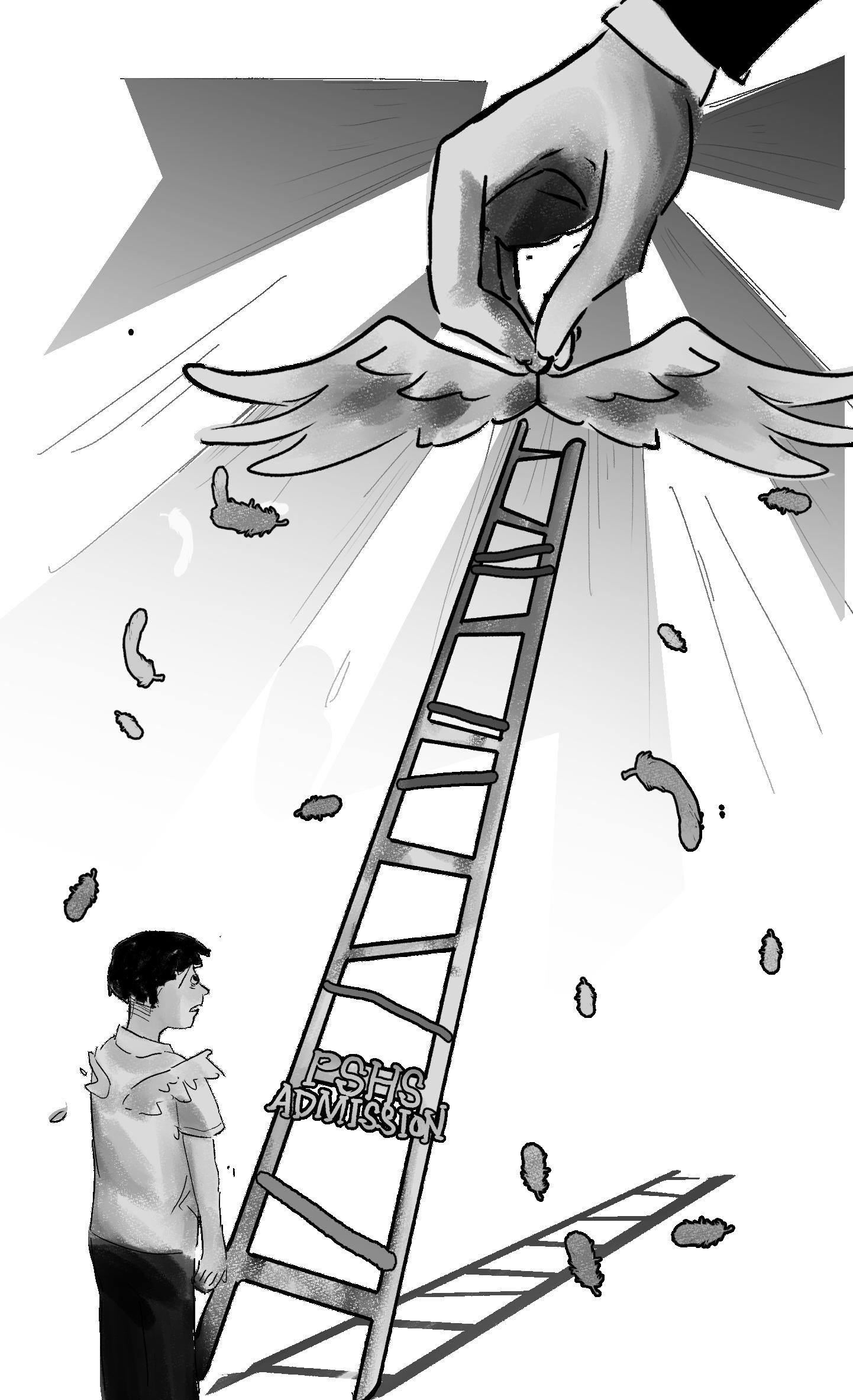


To quote President Abraham Lincoln, “A house divided against itself cannot stand.” This is a lesson nations have had to learn time and time again, however, despite this, there are those among us such as Congressman Richard Gomez who aim to divide for personal gain simply for personal political gain.
As of November last year, Richard Gomez introduced a new bill to the House of Representatives which outlined the creation of a new province of ‘Western Leyte’ through the secession of the Bisaya speaking areas of the province from the larger province of Leyte. With this, the newly independent province would supposedly benefit its citizens through centralizing critical facilities around its proposed capital, Ormoc, rather than the provincial capital of Tacloban. This is as cultural, linguistic, and geographical barriers separating the areas apparently hamper members from the western areas of Leyte from accessing these facilities. Thus, allowing for a more convenient hub through the autonomy and in turn development of Ormoc from the rest of the province would serve the citizens well.
However, there remain several key flaws with the justification given for this new province which we may in turn compare to lessons we have learned in history’s past such as in the American Civil War. The Confederate States of America, also known as the South, seceded to uphold supposed state’s rights and individual liberties. However, the reality of the situation simply was that the fight for
independence was a fight for the plantation owning elite to own other people only due to the color of their skin. The secession was pitched as benefiting everyone, but behind the curtains, it was just the entrenched ruling class who would benefit.
Despite the American Civil War happening two centuries ago, its teachings have still somehow gone unheeded by some to this day. Similar to the claims made by the South all those years ago which were too good to be true, the ones made by Congressman Gomez also are. Ormoc already serves as a hub for large amounts of Leyte and Southern Leyte, as it is the second most populous city in the entire region of Eastern Visayas. With this, the creation of a new province would only serve to further encumber Ormoc with having to create its own administrative bodies and bureaucracy centered around it without any real benefit to its citizens and the rest of the proposed Western Leyte.
Yet, in spite of this, once again alike with that of the Confederates, there remains those who would benefit from the province’s autonomy, the ruling class which Congressman Gomez himself is a part of. Aside from being a current member
of the House of Representatives, Richard Gomez has previously been the mayor of Ormoc City. Alongside this, his wife Lucy Torres-Gomez has had a similar political history being a former member of Congress and currently the mayor of Ormoc. In fact, the two simply swapped political offices between their terms. Thus, the Gomezes have created an effective monopoly-like stranglehold over the city. With this, a new province centered around Ormoc would provide them one more avenue to further rule over local politics through effectively appointing a governor of their choosing for the province allowing them to buck the Petillas and Romualdezes of more Eastern fame. Although these other political dynasties are no better than the Gomezes of Ormoc, separating the province of Leyte in twain would simply further eliminate competition between them and allow for greater control over their respective provinces.
Thus, as has been learned for time immemorial, those who seek to divide others to fend for themselves, separation not only serves no benefits, it in fact harms the ordinary people, but benefits the ruling elite. For, these families seemingly have only one thing in mind–divide and conquer.


What exactly does it say when voters cast their ballots based on familiarity with the candidates instead of understanding their platforms and assessing their actual capabilities to lead?
In the realm of politics, votes are often cast due to the significant influence of a candidate’s name recognition. However, Filipino voters should shift their focus to a candidate’s qualifications, competence, track record, tenacity, and accessibility to the masses. The country’s leaders should bring sound value, strong educational backgrounds, and extensive leadership experience.
One significant issue currently faced by the country is the tendency of voters to equate a candidate’s visibility with capability. Recently, several well-known celebrities and entertainers have taken the position of public servants, successfully gaining mass support despite lacking leadership skills and political experience. Yet, this problem is not solely rooted in the nation’s voters, as many are not privileged enough to gain access to quality education. Those who have inadequate awareness and understanding fall victim to manipulative tactics during campaign periods. Even before the election, candidates often use the “mere-exposure” effect. This involves distributing printed materials with their faces in certain areas to gain repeated exposure. This tactic subconsciously influences the minds of voters, making the candidates appear favorable and fit to be leaders.
Indeed, fame plays a significant role in a candidate’s electoral success. For example, former Department of Interior and Local Government Secretary Benhur Abalos, now a senatorial candidate, appeared in the Philippine TV action drama series “Black Rider” broadcasted by GMA. Despite already being a prominent figure as DILG secretary, Abalos probably did it to gain more public exposure and establish a sense of familiarity with a large scale of voters who still do not recognize him.
Celebrities and online influencers who run for public office should reflect if they are competent enough to serve and help the country, rather than adding to the existing problems of the country. For example, Deo Balbuena, also known as “Diwata” or “Diwata Pares”, decided to file COC as the fourth nominee of Vendors Partylist regardless of his lack of understanding of the laws and skills to create beneficial policies, make changes, or effectively deal with contemporary social problems. In an interview by Rappler on October 2, 2024, Balbuena gave only indirect and circular answers instead of being straightforward with what specific policies or laws the Partylist has to offer and how they will be
implemented. This just goes to show the importance of ensuring that those who are being put in power have the skills and political experience the position requires.
It’s not sufficient for people to know the candidate; the candidate should also know the people’s needs. Candidates who already believe that they are qualified should still bear in mind that other candidates might be more qualified than them. Those who are running for office should be fully aware and should be reminded that they are pursuing a duty and responsibility, not a hobby.
Another alarming issue is the country’s legal loophole that allows convicted individuals to run for public office. Due to the state of rigidity and inability to address contemporary issues of the constitution, candidates with criminal convictions, but whose cases are under appeal or have been pardoned, can still seek office as legally stated under the 1987 Philippine Constitution and the Omnibus Election Code. One notorious example is Kerwin Espinosa, a confessed drug lord, who filed a candidacy for mayor in Albuera, Leyte despite ongoing legal battles.
These are just a few of the heavy burdens and unfortunate realities in our country. The nation is still categorized as a flawed democracy. The system tends to favor the famous and wealthy, or the stars and the “big-time.” This dynamic not only allows criminals to evade the full consequences of their actions but also hinders those less-known candidates who have the skills, knowledge, and commitment to public service to secure a spot for public office.
The trend of celebrities, influencers, and convicted criminals to hold office in the country endangers the integrity and democracy of the nation. A candidate’s fame or popularity should not be a deciding factor in selecting leaders. The country has made significant progress through the sacrifices of countless Filipino heroes, and honoring their contributions requires breaking free from ignorance.
Filipinos have long been giving power to the hands of those who only make the country poorer. Filipinos have shouldered this burden for too long and it persists to weigh heavier with time. Now is the moment to make wiser choices, have good judgment, and regain consciousness. This won’t change the past, but it gives back to the Filipino people the future of the Philippines - the country sworn to love and die for.
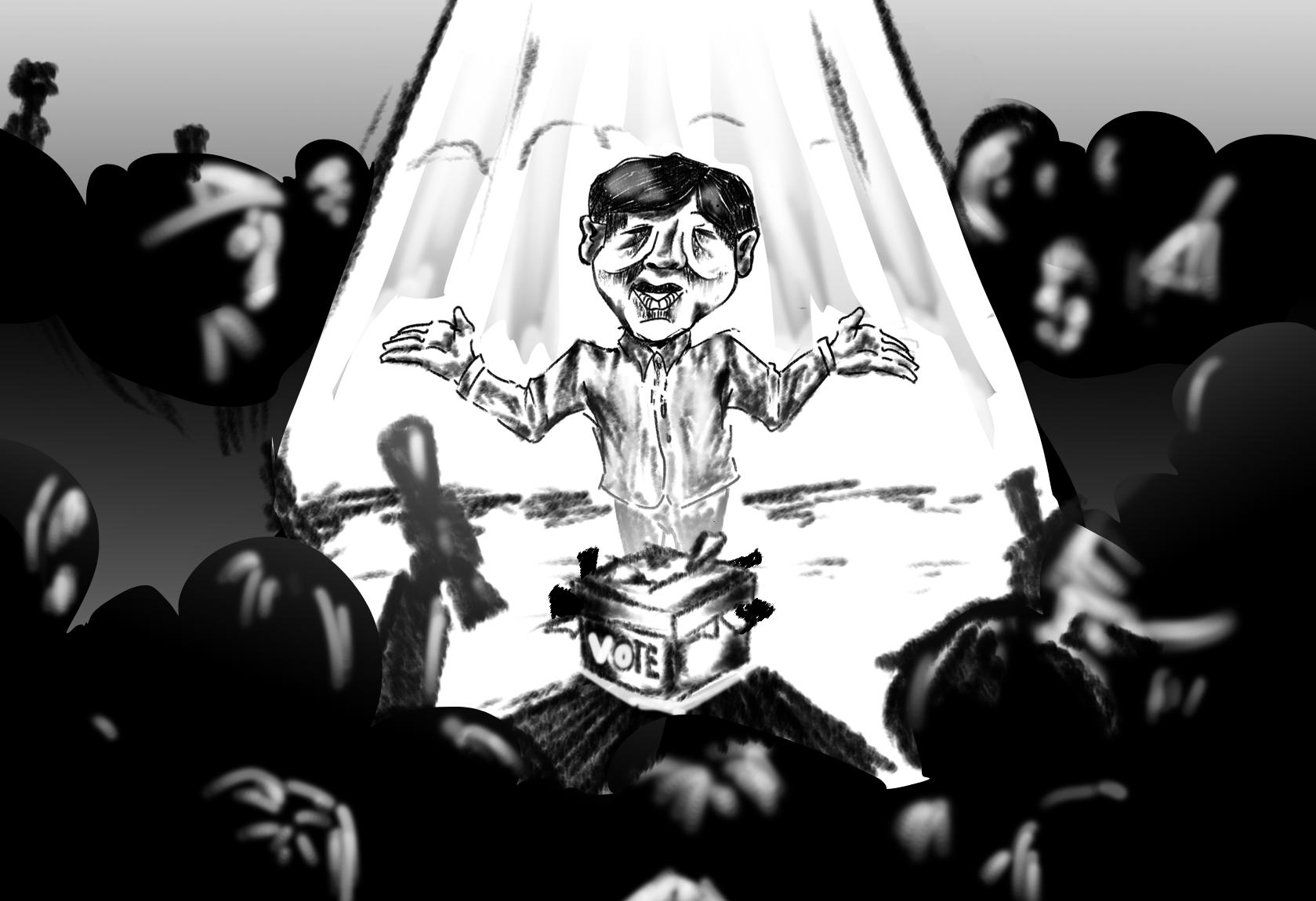


ast December, the Senate Committee on Science and Technology approved the Expanded Philippine Science High School System Act which aims to, among other things, broaden the PSHS System to two campuses per region instead of just one. Admitting only around 1,875 applicants out of 23,000 to 30,000 each year, the PSHS System seeks to address the low campus-to-applicant ratio by allocating funds for developing new academic facilities nationwide.
On the surface, this bill seems intuitive. After all, part of the educational discrepancy we currently experience as a nation can be attributed to the lack of science and technology-focused schools built to accommodate those who hail from far-flung rural areas. Thousands of gifted students lack access to specialized curricula to help them hone their skills because they are forced to enter subpar educational institutions where their gifts are merely tolerated, not sharpened.
However, although these schools’ incapacity to provide quality education due to high student populations and the absence of academic resources is a valid concern, generating more PSHS campuses that may face similar challenges as well as ones experienced by currently existing campuses does not solve the problem; it only exacerbates it.
Being a student in one of the System’s provincial campuses, I can attest to the struggles the school faces as a public high school obligated to cater to the needs of students expected to gain specialized education in the sciences. From issues such as non-flushing toilets in lockless comfort room cubicles to the lack of research equipment and facilities, PSHS is still far from its promise of being
the premier science high school in the Asia-Pacific region. How can students be expected to excel academically in a global arena when they are unable to conduct their research efficiently, much less use a working toilet stall?
It is no secret that a good school environment is a prerequisite for an equally successful student population. What good, then, will additional campuses serve if the ones currently in operation cannot meet their students’ needs?
Instead of allocating its budget to the development of future campuses, the PSHS System should focus on improving the conditions of its existing ones. By assessing the areas, whether in terms of facilities or curriculum, where students feel hindered in their education and then subsequently addressing those gaps, the system ensures that nobody is truly left behind.
It is easy to look at the disparity between the number of PSHS applicants and how many each campus can accommodate and immediately point to expansion as the solution. However, for educational institutions to thrive, they must put quality before quantity, keeping in mind that by solving currently existing problems, they prevent these same problems from occurring on future campuses.


What good, then, will additional campuses serve if the ones currently in operation cannot meet their students’ needs?
As PSHS-EVC students, we take pride in our school, but our restrooms remain a major issue. Many lack basic toiletries, and some, especially female restrooms, are barely functional. Broken stall doors and non-flushing toilets force students to search for usable facilities, wasting time and causing discomfort. Clean, well-maintained restrooms are essential for health, dignity, and productivity. I hope the administration takes steps to address these concerns, ensuring that all students have access to sanitary and functional facilities.


Access to clean, functional restrooms is not just a convenience—it’s essential for health, safety, and dignity. Broken stall doors and non-flushing toilets create an unhygienic, uncomfortable environment no student should endure. This issue reflects the school’s commitment to student well-being. We hope it reaches the right people and leads to lasting improvements. Thank you for speaking up.

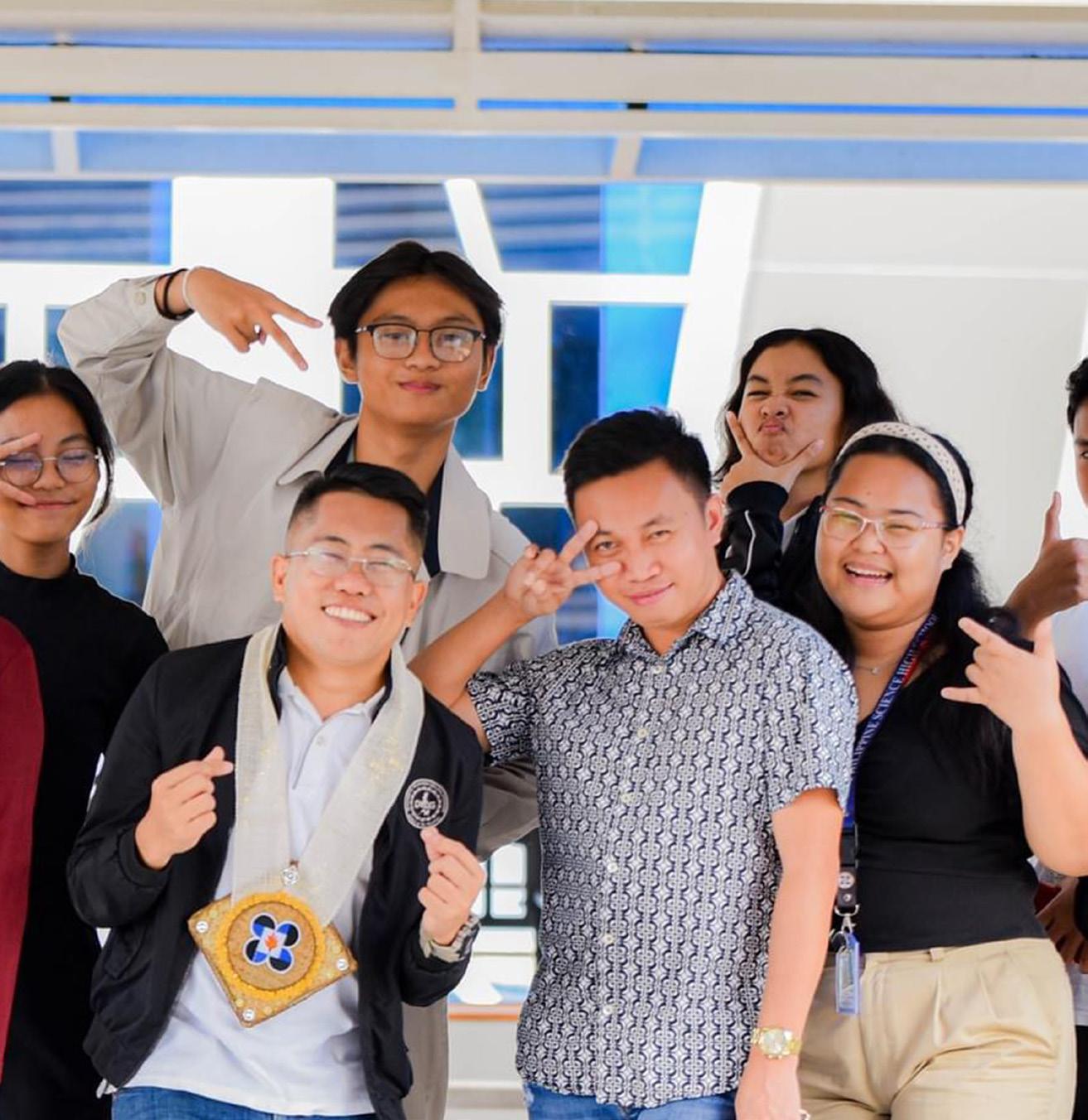



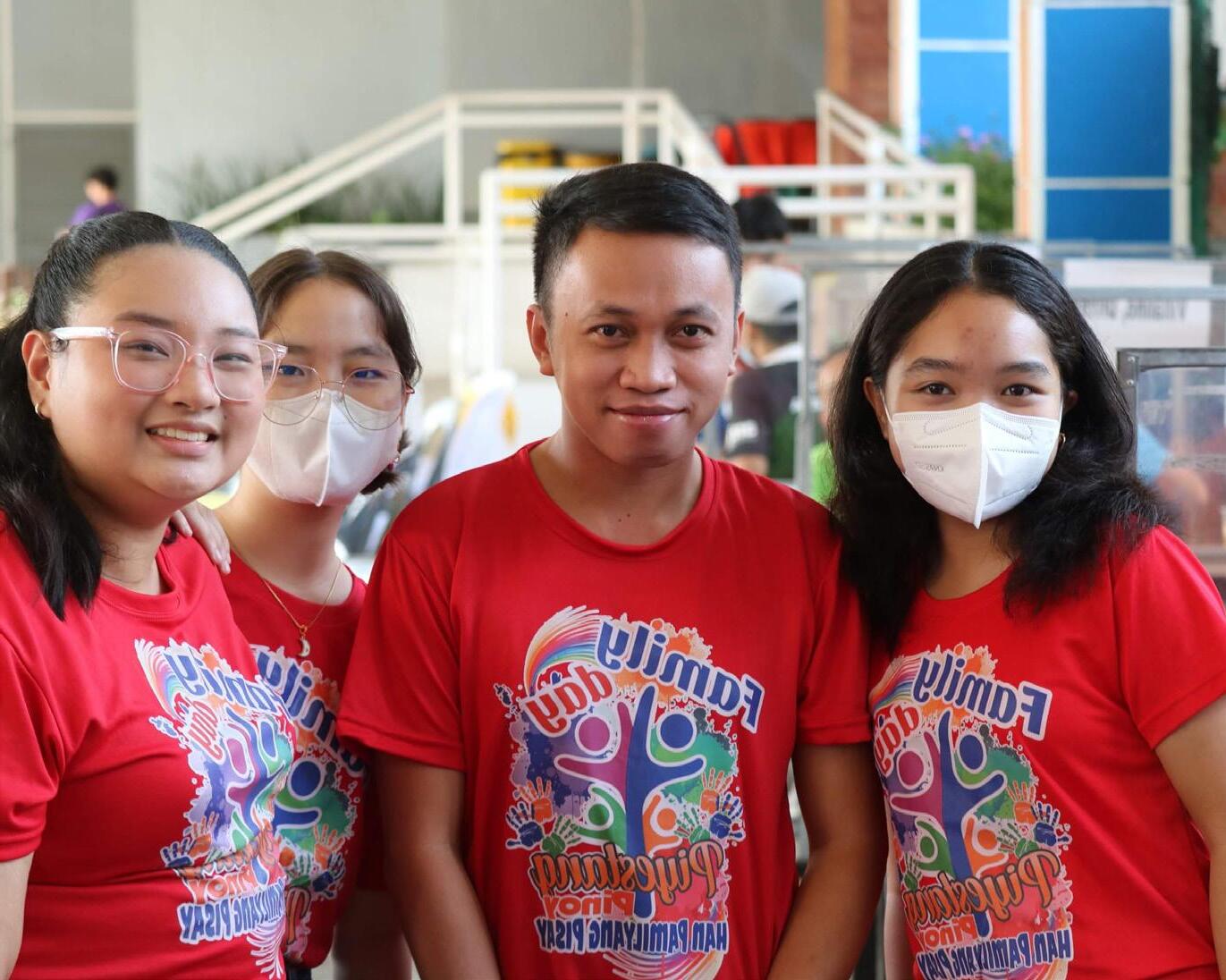

Though, it was in books or movies, where I could turn back a few pages or rewind a few minutes, and things would return to how they were. Within these stories, there would be some sort of foreshadowing—events leading up to a character’s passing that would have made sense in hindsight. Inside these fictional worlds, death was nothing but a narrative tool, something I could escape by closing the book or pausing the movie.
Turns out, that’s not how it works in real life. I met you again almost three months ago; it was the real you this time. You arrived through a Messenger call the night before a life-defining examination. Every college admissions Facebook page had advised me to get a good night’s rest on the eve of the test, but how could I when the shock was still pulsing through my veins?
Grief, I grew to hate you. You came uninvited in the form of a faded-out word written on the Speech Lab whiteboard—a remnant of the handwriting that has brought many stories to life. You lingered inside the 11-C classroom, flooding it with memories of an English research class I yesterday. You haunted the hallway outside the publication office; I walked its length to relive conversations that now exist only in memory. In these spaces, you weren’t just Grief but also Regret, Frustration, Fear, Anger, and Hopelessness.

No matter how often I told you to leave, you’d come knocking on my door, begging to come inside. So, I ignored you in my attempt to seem strong and composed. I pretended it didn’t hurt when I first heard someone refer to him in the past tense. I swallowed the lump that formed in my throat when I had to leaf through photos for a tribute. I blinked back the tears and put on a brave face when you barged through the door on the days when I felt like I could keep it together.
Exhausted at having to constantly lock you out, I decided to let you in. And only after sitting with you through quiet moments of mourning did you reveal who you also were— Love.
You held my hand as I cried over moments when this love played in the background: unwinding in a public park in Abuyog after a grueling contest day, peeling freshly harvested Indian mangoes inside the PEHM faculty room, and having a late-night talk about dreams and what it takes to achieve them. You sat with me as I realized that all the pain I felt was just the patience, kindness, and acceptance I received but never got to thank. All the times you interrupted my life were just you trying to help me remember that there is Grief because there is Love; we only suffer so much because we’ve been given the amazing opportunity to have known someone so incredible. As long as I’ll live, I’ll carry you with me. There
will be days when you will feel like Grief and some when you will feel like Love. But either way, you are proof of what once was here, and for that, I am forever grateful. I may not be able to rewind the seconds or flip back the pages, but I take great comfort in knowing that, in this story, I had once been a fortunate recipient of a love that did not know how to give up.
Grief, for the longest time, I had been ashamed of you. I kept looking forward to the day I would no longer feel the ache that his absence left, but thank you for reassuring me that being sad is nothing to be embarrassed about. Missing someone so much to the point of pain is proof that I had a person worth loving in the first place. The loss does not make the love any less real; if anything, it only amplifies it.
My words are a little too late for the person I’ve lost, so I write this in the hope that you stay with me, Grief. I will open the door when you come knocking because the pain that you bring is also a reminder of the life that once shaped mine. I will welcome you like an old friend because that is exactly what you are, for I understand now that you are just Love in a different form—something that stays even when everything’s gone away.


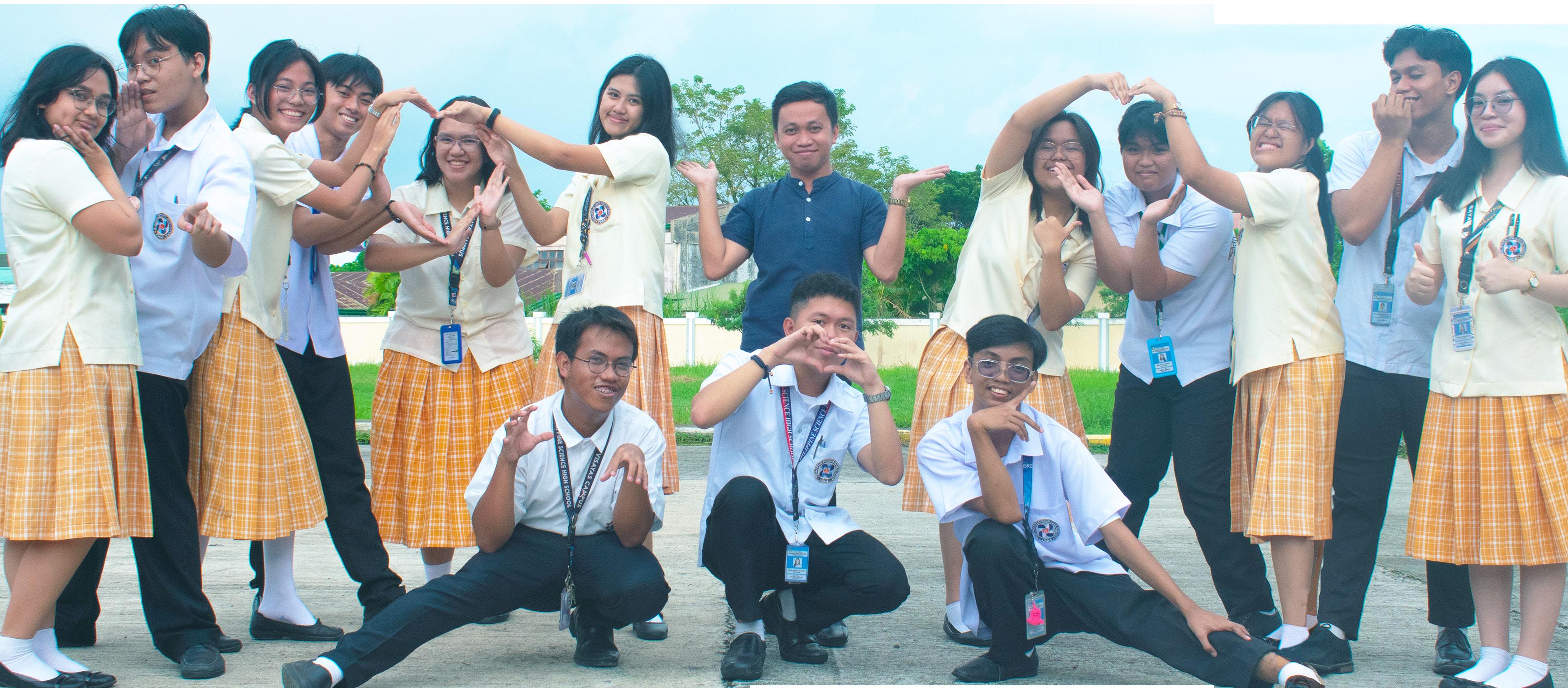





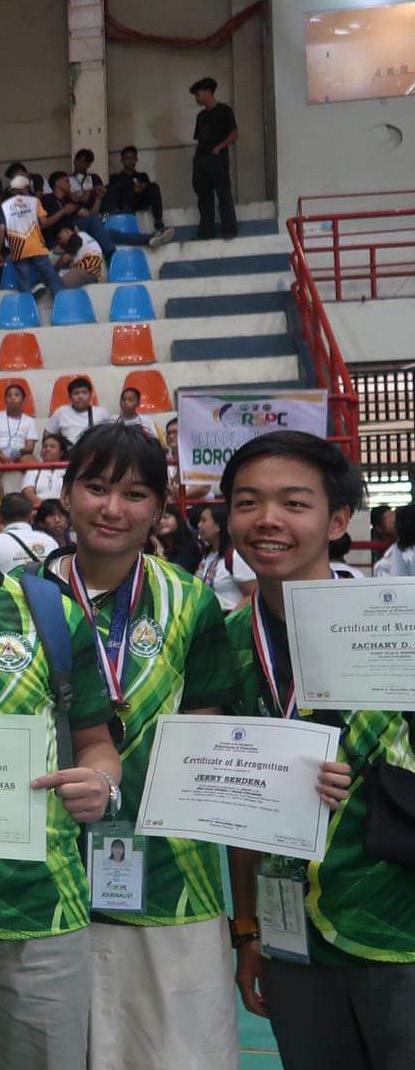


For Mrs. Gaye Petillos-Tumulac, fondly known as Ma’am Gaye, teaching was more than a mere profession—it was a melody she sang through the hum of experiments and the steady stream of discussions. It was a rhythm she had mastered, a tune that seemed to never cease.
But in a twist of fate, that rhythm fractured.
“I felt hopeless and shocked.”
What started as recurring headaches, temporary vision loss, and bouts of hearing loss brought about by her ear infections soon morphed into something insidious that would alter her life completely– a diagnosis of cholesteatoma and acoustic neuroma in 2021.
Though complicated surgeries to take out the brain tumor ultimately saved her life, they could not save her eardrums, leading to complete hearing loss in her right ear. Physical therapy sessions improved her condition, and unwavering support from her friends and family kept her grounded.
and charades, how students learned and use sign language during recitations, and how her audiologist encouraged her to continue her profession despite being hard of hearing.
“Try to fight the insecurities that consume you and show the world what you can do in spite of your disability. Embrace, accept that disability too.”

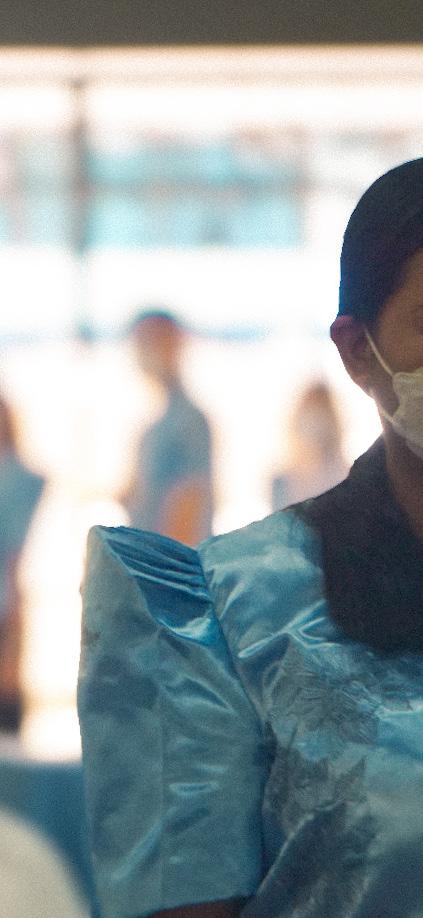

But just when she thought that the worst was over, she caught meningitis while recovering from her surgery. She began to suffer from hearing loss in her left ear as well– something that not only threatened her teaching career, but also the way she connected with the world as a whole.
“After losing my hearing, I was panicking and asked myself if I could continue teaching [..] The possibility of being transferred to a non-teaching position made me cry.”
Despite life’s adversities, she stands as a beacon of hope– and hopes to be the same for other PWD teachers and professionals. Her persistence is a testament to the sheer passion that she has for educating young minds. She wishes to be seen not through the lens of her disabilities, but through the boundless potential of her capabilities.

This new reality of life was daunting at first. How does one continue a calling that depends so deeply on listening to the world—the voices of students and colleagues, and the subtle sounds of life that shape a teacher’s intuition and adaptability? More than that, how is one to live?
She had found herself scared of interacting with others in fear of inconveniencing them. There were significant shifts in her life– from the way she communicated at home to the way she had to approach her profession. But even in the midst of such changes, it was those around her who served as pillars of her recovery. She fondly shares stories of how her children have become masters of gestures
I hope people see just how much we can do, that we may be limited or different in some ways because of our disabilities, but we can also offer so much more
For Ma’am Gaye, her teaching could never be defined as a mere profession– it’s a symphony where the absence of sound amplifies something far greater: resilience, passion, and the unwavering belief that no hurdle can hinder a true educator’s voice. It’s a rhythm no longer fractured– if anything, it’s a symphony louder and more magical than ever.
“I hope that I won’t just be teaching chemistry, but inclusivity and self-acceptance as well.”





Many people leave the comfort of their hometowns, ferreting out answers for their baffling dilemmas in life; thus, they shift towards the city life. A caption on a TikTok video that I had just stumbled upon reflects this sentiment perfectly: “Seeking stability and happiness, we should trade the comfort of our hometowns for the promise of city life.” These were the words that struck me as sincere as sunlight hitting my face in the dappled afternoon, and I couldn’t help but to agree. But unfortunately, not a single word in that sentence was true.

As time passed and the hustle and bustle of the city life began to settle in me, the promise of comfort and belonging began to feel like more of an ideal and less of a reality. In the quiet moments, when the adrenaline finally fades, it resurfaces, tugging gently at my heartstrings. As I come across a dish from the canteen’s menu, whose aromatic scent finds its way to my consciousness, I suddenly transcend life’s reality. I’m a kid again—a kid whose dreams were to simply fly a kite amidst the landscapes of the province. A kid whose dreams were to ride a carabao, accompanied by the constant tugging of my Mom’s shirt, implying the desire to ask for Lolo’s permission.
I once dreamed with simplicity—those delicate as morning dew. But now, they’re as complex as trying to cram three tasks in one go during hell week.
December 2024. Cold evenings. Pisay’s hell week before the Christmas break. Despite the examination dates being encircled with bright red ink on the flimsy, freebie calendar drawing near, I chose to
track the days since the last time I had visited my grandparents’ house, where an approximate number of 99 days had unknowingly passed. I thought to myself: “Kumusta na hira Lolo? Nakakamingaw an ira luto.” How strange it is that the moment you get out of the space that you were in for a very long time, you get a rush of melancholy—craving and looking for pieces of it back again though just years before, they were bits of your life that you never seemed to spare a second glance at.
But as much as my life in Pisay felt like a series of “no more” moments, it still carried the promise of new beginnings—ones that wouldn’t be defined by a constant ache or an unyielding longing for something lost. Leaving the province in pursuit of stability in the city life does not necessarily mean I would want to abandon the life I had lived before, nor the roots that had shaped me; perhaps this was a glimpse of the reality and what the future held— no more holding Lola’s hand, nor hiding behind her figure, and burying our faces in her when we feel afraid.
There still exists a peculiar ache in missing the province. With time’s passage, the ache still lingers—not gone, but softened. It fades, not with the absence of people and the warmth of your hometown, but with the welcome of new faces and connections.
Undeniably, the longer we stay at Pisay, the farther we grow apart from our home; however, something persists. It’s the warmth of being surrounded by something new—unlocking new friendships, starting new experiences, and achieving new horizons. The city may not have been the place you came to know, but in its own way, it slowly becomes a home, an unexpected, unorthodox kind, yet somehow perfectly yours.


mediocre /mēdē.ōk.r/
Definition: of only moderate quality; not very good.
Mediocre was a word that frequently passed my mind. Sometimes, I feel as if it’s the only word on my mind.
I had always thought highly of myself during my fundamental years. I had never failed during elementary. I had never laid my hands on a math book to revise for a test. I had never found it hard to understand and grasp information given to me. Simply put, I had never experienced failure— and I thought it would continue on as such. As far as I knew, I was a star who had never even grasped the concept of the dark.
But ever since I stepped into this new galaxy, a plethora of stars and an even more vast darkness in between them, the contrast between the two became even more apparent. The stars being the geniuses of this world, shining amongst the rest— and the darkness, the supporting characters, those who aren’t bright enough to shine amongst the best.
This vast galaxy held no place for me to shine as bright as I used to.
In all my years in Pisay, I have always felt out of place. I often feel that I’m a puzzle piece being jammed into a space where I don’t belong. I am constantly surrounded by prodigies who seem to have never felt pressure during an exam, or lazy geniuses who have never laid a single finger on a math module, or even those who continue to work hard in spite of their preexisting aptitude. I’m constantly surrounded with what I used to be. And to no longer fit into none of those categories made me wonder…
Have I really lost my spark?
In the 10th grade, I remember staying up all night for a chemistry exam we had. I

questions over and over again until the topic had been engraved in my mind. Despite that, all of my efforts proved futile. To hear my classmates talking about how they felt the exam was easy gave me an epiphany. It was then and there that I finally understood that my intellectual capacity was not up to par as theirs— and that I was nothing more than mediocre.
This generalization of myself has stuck with me ever since. It’s humbling really— maybe even crushing. These thoughts clouded my mind, though I tried my best to brush them off. I was constantly fighting myself, trying to hold onto that last glimmer of hope within me.
But after years of living with it, I slowly accepted the fact that I wasn’t particularly good or bad at anything, and that I was just simply surviving in this environment. This acceptance was hard to embrace. After all, how is one to accept that their brightness is incomparable to the ones in the constellation?
But in spite of all the ache my mediocrity caused me, it brought me into a new sense of clarity. The turmoil in my head simmered down gradually, and I finally came to terms with such a title some would deem unfavorable.
The state of mediocrity never stopped me from aiming for the stars. There is no permanence in it. Perhaps one day, I’ll catch up to the stars; finally joining them in the constellation I looked up to. But, in order to break your limits, you must understand them first.

Iam not much of a dog person. My mother told me growing up that I was allergic to them. It was never confirmed, but it was enough to keep my distance. I have never had, touched, or loved a dog. When I learned my host family for the Ritsumeikan Super Global Fair (RSGF) 2024 owned a dog, neither I nor my nose was particularly excited. For this program, I would be living with my student host for a week in Japan. Her name was Kaho Okimura, and she introduced herself with more pictures of her dog, Nagi, than her face.
I first met Kaho and her dad near Kyoto Station. It was late, and they were the only ones I could see smiling in a stream of tired, cold people. After welcoming me, the first thing Kaho asked was, “Are you hungry?”. I told her I was starving, and that I was happy to eat anything that wasn’t shrimp since it makes my eyes red and gives me rashes around my lips. Kaho looked at her dad, then repeated “no shrimp” to him for a few seconds. Every day after that, my walk home from Ritsumeikan started with Kaho asking me that same question. Whenever we had dinner at a restaurant, she’d cover pictures of shrimps on the menu and double-check with the waiters if my meal was shrimp-free. On the nights we ate at their house, Kaho’s mother told me not to worry about anything, since she had an EpiPen ready for me in their drawer. Something about that EpiPen made meals with Kaho’s family feel like home. Sure, I was paranoid that if I scratched my eye a bit I’d get injected
divided into discussion groups. I was in Group 5C with 8 girls from different backgrounds. Odds were against us—language barriers, age gaps, and dare I say even height differences. But if boys will be boys, then girls will be girls. It started with shy smiles and small talk. Then, we’d accompany each other to the restroom, dance together, match keychains, and share snacks, school drama, or whatever our obsessions were. All these inside jokes and silly pictures. Our niche hobbies and embarrassing past selves. Suddenly, everybody stopped feeling so distant. I became more comfortable opening up a conversation with new people because I knew I’d always have 5C to return to. On the last day of the RSGF 2024, everything wrapped up. Throughout the week, discussion groups collaborated to make their final outputs. As 5C, we presented our motto and solution on how to manage overtourism. I bade farewell to the school that catered for me the whole week, with all the friends I’ve made and all the green tea I’ve drank. For the final night, I walked home with Kaho. She met me with the usual question and asked if I wanted to eat. Her dad served Japanese Hamburger Steak, or Hambagu, and plenty of persimmon since he saw how I finished a bowl of one just the other day. I couldn’t help but notice how much had changed since that first night. I was no longer awkward-




“This win is for all of you.”
Six long years had passed since the crown for EVC’s Binibining Pisay was last claimed by House Z Tala in the 2019 Sportsfest. This year, Leila Noelle Sabando rose to the challenge, reclaiming the title and triumphantly bringing it back to House Z Arimaonga in this year’s Sportsfest 2025.
One week. That was all the time Leila had before strutting towards the spotlight of the competition that awaited her on stage, with hundreds of pairs of judging eyes ready to judge her every move. In those seven days, Leila’s feet had been pounding in pain from the strain of hours of program rehearsals and swaying from foot-to-foot on high-heeled shoes.



ly fumbling over my chopsticks or dreading the thought of our upcoming presentations. And there, on my lap, was Nagi, who would try to get a bite of my food each time I looked away. After dinner, I prepared my luggage and the many bags I couldn’t carry with my hands. I had one with trinkets and snacks from newfound friends, one with all the KitKats and refrigerator magnets to bring home, and another stuffed with letters. Both my stomach and heart had never felt so full.
What a privilege it was to share my life in the Philippines and, in return, hear others’ versions of home. The RSGF 2024 opened my eyes to how different, yet similar, our lives can be. I met students from the other side of the world—places where it snows for half the year or where the roads are safe enough for people to bike anywhere. At first, these differences felt so vast. But as the week went on, I realized how connected we remain through small things: music, a favorite TV show, or even the simple experiences of growing up as girls. Thank you to Group 5C and Kaho for helping me find a home somewhere so far away from where I live. Thank you to RSGF for giving me the social and cultural experience of a lifetime. Now, the world doesn’t feel quite as overwhelming. And yes, I no longer flinch at the thought of holding a dog. I’m even thinking of getting one— thanks to Nagi.



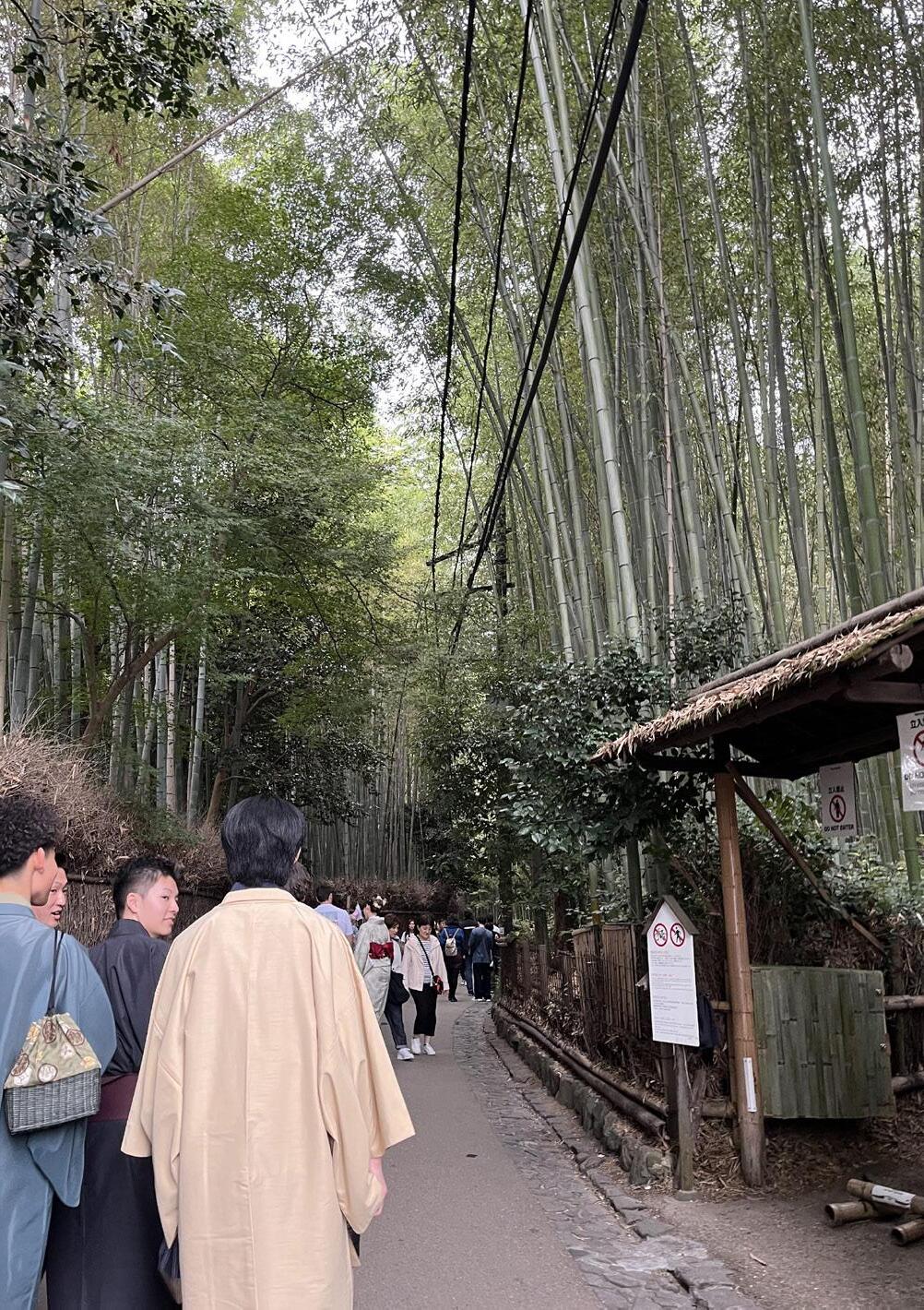
crolling through your meticulously crafted feed, there is a jarring moment when you realize you don’t recognize the person staring back at you—not in the mirror, but in your carefully curated grid of posts. The posed candids, the filters, the corny captions, the Y2K business core outfits, none of it feels like you anymore. Social media is often more than just a platform for self-expression—it is a mirror, a stage, a mask. But in chasing after the illusion of a perfect picture, have we unknowingly cropped ourselves out?
Scroll.
Picture this: you’re laying in bed, on that app that you’re always in and then you come across a perfectly curated post and find yourself stumbling into someone else’s life—perfect skin, perfect Pinterest wardrobe framed by perfect boujee lighting.
As you reflect on your own life, a three syllable word starts to form a lump at the back of your throat:






But beyond the physical strain, it was the mental and emotional stress that came with planning for the talent portion that truly tested her. The quickly approaching event had her scrambling for ideas—ones that would captivate the judges and make her stand out from the rest. Eventually, Leila found herself lying on her cold, tiled, bedroom floor, swallowing in a hole of self-doubt and worth at three in the morning. But as minutes on the clock ticked by, she decided on a performance that would showcase her own talents, embracing simplicity and joy over complexity and others’ expectations.



“sa - na - ol”. Familiar? In the case that it is, you’re in good company, that same sense of longing has spread like a contagion. With influencers being the prefects of Perfectland, they have created an illusion of unattainable ideals, causing us, the carriers of unrealistic expectations, to lose our sense of self to conform to a flawless image.
Swipe.
With every brush of a finger, we’re pulled along by constant shifts of ever changing trends. One moment you might be plagued with ‘old money’ outfits and compression shirts while the latest Bruno Mars song plays, and the next, you’re keeping up with Kiel the Great’s style and the new SZA album—because, of course, you can’t be left behind. In an algorithm-based society where trends dictate identity, hype signifies taste, and mass appeal drives acceptance, individuality fades—and is replaced with a sort of ‘thank u, next’ mentality in probing for the new craze.
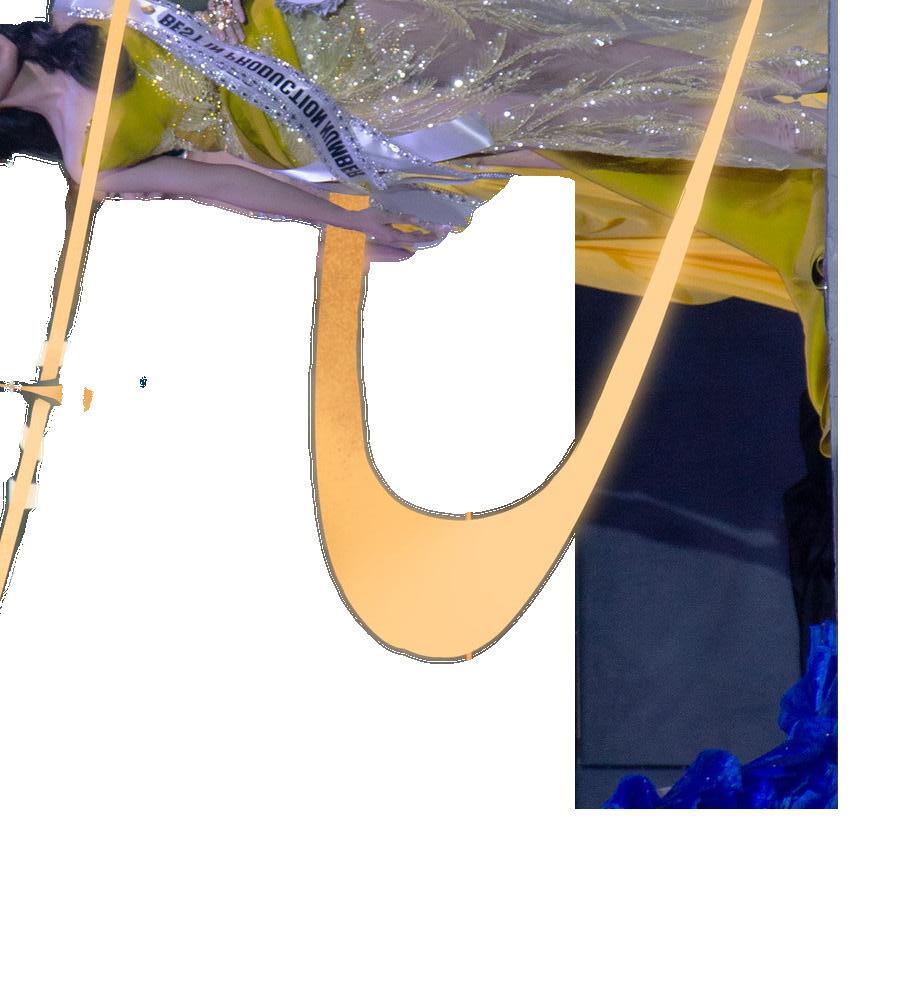
With limited time, Leila’s stunt practice sessions were condensed into just two late-night cram sessions. Her performance on stage, however, showed no signs of a poorly-prepared act. Her confidence and enjoyment overflowed all throughout, receiving a loud uproar of chants and exhilarating praises from the crowd for her passion-filled, authentic display of talent.
The rest of the performance was no breeze for her either; it proved just as grueling. Leila’s feet had numbed from the platform shoes and her vision had occasionally gone hazy, making it harder to focus. The gnawing sense of failure never left her subconscious either. “My
talent portion was not good enough. My poses weren’t good enough,” she silently scolded herself as she continued to parade the stage.
Leila’s focus shifted to the gymnasium, now a roaring den of lions, with cheers growing louder with each performance. The deafening support from her fellow housemates and friends gave Leila the strength to push through. With each roar of encouragement, her doubt melted away, replaced by an unstoppable drive to finish strong.
“I wanted to give my housemates a reason to cheer, to feel proud, and to celebrate together… More than anything, I wanted to give my house a moment worth remembering” Leila expressed, reflecting on the moment.
And what a moment it was when the noon unveiled the new owner to the crown, declaring Leila the newly crowned Binibining Pisay of Sportsfest 2025.
As her victory filled the gymnasium, Leila was overwhelmed with gratitude. She shared that the win was not hers alone, “It was my way of giving back to the community that shaped me into the person I am today. This victory was never mine alone—it belonged to everyone who believed in me.”
We lose our authenticity in pursuit of the perfect photo dump, only to be rewarded with hollow comments of people speaking in hashtags, memes, buzzwords, and slangs. The sacrifice of our sense of self was paid back in full with an arbitrary number of fleeting followers, likes, and heart emojis, offering a brief moment of validation before being injected with the feeling that we need more to feel enough. Incapacitated by the cyclical nature of approval, we start chasing after doses of appreciation that are as transient as the screens we scroll through. Eventually though, like a body succumbing to illness, there will be a moment where it’s evident that we have to stop.
Deactivate.
Social media mirrors reality and distorts it into a stage, suturing it into a performance choreographed for the feverish demands of an audience—but it doesn’t have to be a chronic issue. Socials allow us to show the unfiltered, authentic parts of ourselves that make us—us and not just the polished highlights we believe will please people.
So post those spontaneous moments framed by natural light no matter how far it is from your aesthetic or curated lifestyle. Let yourself be unfiltered on social media, and you’ll find that everything will begin to feel like



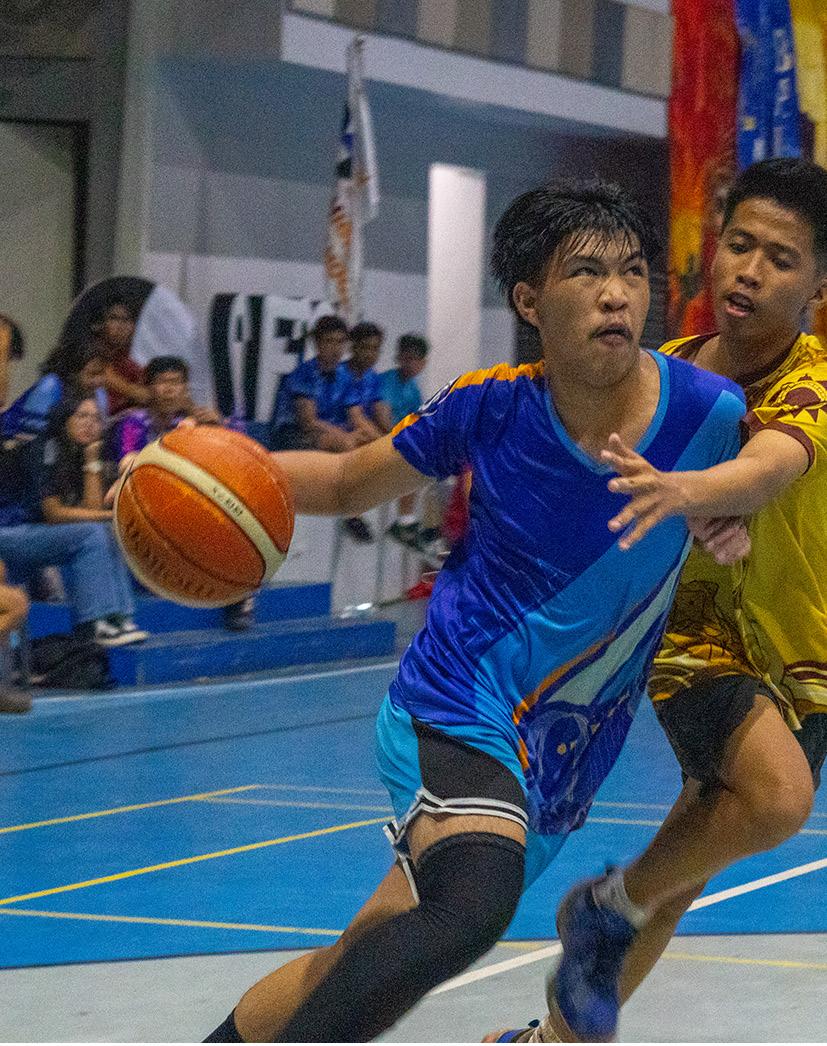




Holding the court in their control, Arimaonga secured a commanding 39-33 victory over Bakunawa in the Basketball Category C championship game during Sports Fest 2025 at the Philippine Science High School – Eastern Visayas Campus (PSHS-EVC), January 23.
Raimond Ladines delivered the decisive moment with a clutch layup in the final 18.69 seconds, sealing Arimaonga’s four-point lead and extinguishing Bakunawa’s last hopes of a comeback.
Playing in his final Sports Fest season, Roswell Magallanes emerged as the team’s offensive anchor, leading with 12 points through sharp layups and mid-range shots.
“This win means so much to me. It’s my first and last time as a basketball champion throughout my stay in Pisay,” Magallanes shared. “I want to thank my girlfriend for being my number one motivation, as well as my friends for their unwavering support.”
Starting the game off strong, Magallanes opened the scoreboard with a strong drive to the basket, followed by a three-point play from Zac Faraon.
Bakunawa struggled to capitalize on their possessions, with Richard Gerilla and Kenji Icain missing crucial three-point attempts, allowing Arimaonga to dominate the first quarter 10-4.
Momentum remained with Arimaonga in the second quarter, as Mark Valdez intercepted a pass and converted the first points of the period.
Gerilla responded with a three-pointer, and


NEARLYN LUMAYNO
Adding more fuel to the fire, de los Reyes and Suan expressively rocked to the song I’m Still Standing with clear determination to secure the top spot.
Still standing strong, pairs 01, 02, and 03—the top three pairs—were called back to the dancefloor to face off once more, fearlessly performing the cha-cha, samba, and jive.
After a stunning display of performances, de los Reyes and Suan managed to soar their way to the top and bag the gold medal, while Gabrielle Cordeta and Paulind Cotoner of House Y clinched silver, and Chelene Harden and Xymon Malquisto of House Arimaonga took `bronze.
“We had to practice non-stop despite our busy schedules and the doubts we had about winning, but it was all worth it,” the champions shared.
The tandem added that although they had an impeccable record in their high-school dancing careers, neither had ever participated in dancesport before, making this a completely new experience for them.

Icain added a mid-range jumper, but Arimaonga quickly countered with Magallanes’ four-point streak and a Valdez three-pointer, securing a 21-9 halftime lead.
The tides started to shift into Bakunawa’s favor as they clawed back with consecutive steals and baskets from Icain and Gerilla; however, a well-timed timeout by Arimaonga halted their momentum, allowing them to close the period strong with six unanswered points for a 30-17 advantage.
Bakunawa fought relentlessly in the final quarter as Gerilla scored a fast-break layup before suffering an injury, while Basallage and Icain fueled a comeback with consecutive points, closing the gap despite mounting physical struggles.
Bakunawa’s late surge brought them within striking distance, but Arimaonga refused to waver, with Ladines delivering the final blow—a clutch layup that sealed their 39-33 championship victory.
“Our team’s composition could have been a weakness, but we made up for it by strategizing our plays,” Magallanes noted. “Preparation was key—I jogged for an hour every day leading up to the tournament to condition my body.”
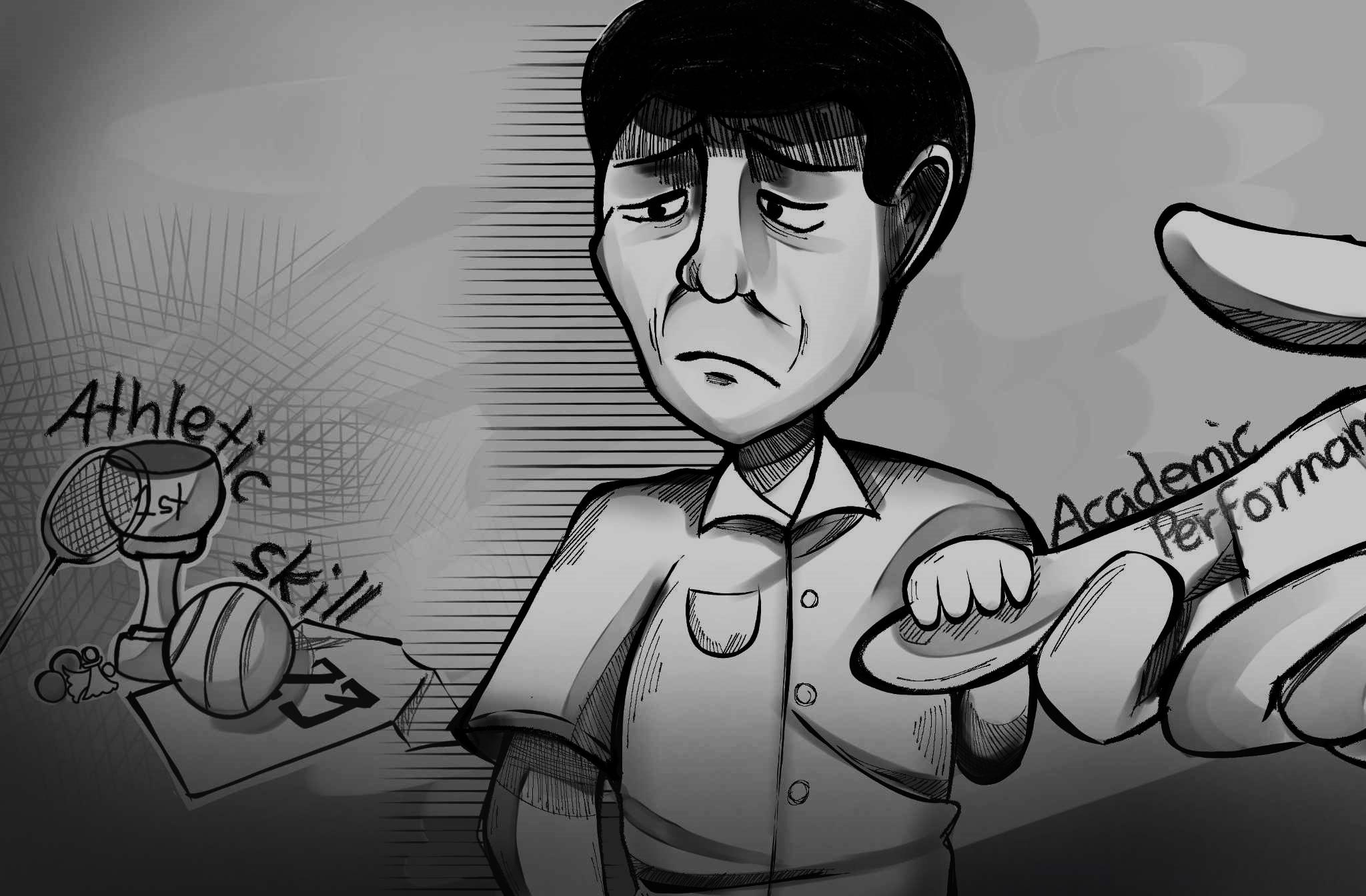
While academic achievement is undeniably essential, it leaves PSHS-EVC students on uneven ground, overlooking their holistic growth. Pisay is known for cultivating sharp minds, but the roots of a resilient character grow deeper through experiences like sports, where discipline, teamwork, and grit are honed. While smaller-scale events like Bethel’s Cup are stepping stones, they don’t match the challenge and exposure that EVRAA offers—a stage that pushes students beyond comfort and onto a regional platform. In a world where success means more than intellectual strength, the choice to limit athletic involvement risks leaves students unbalanced. Academic excellence shines brightest when paired with the well-roundedness of mind, body, and spirit.
PSHS-EVC’s choice to bypass major athletic events is like building a fortress of knowledge while leaving its fields barren. As a school that prides itself on cultivating brilliant minds, it sometimes overlooks that students are whole individuals, not just scholars. For many who dream of excelling in both STEM and sports, this decision can feel like walking on one leg. Interschool competitions are a nice start, but competing on a higher platform is a true proving ground where we can burn brighter and be tested in ways classrooms can’t replicate. Research shows that balancing academics and athletics fosters vital life skills—time management, discipline, and resilience— essential for both scientific inquiry and athletic success. The question, then, should not only be, “Why doesn’t EVC join intertown sports competitions?” but also, “What are
we missing out on by not allowing students’ minds and bodies to grow together, pushing limits on every front?” True leadership comes from this balance—a harmony of mind and muscle, heart and hustle.
Focusing exclusively on academics restricts the overall development of students. Many of the world’s most successful innovators and leaders credit their success not only to intellectual pursuits but also to the lessons they learned outside the classroom, whether on the sports field or through other extracurricular activities. Competitions provide students with an environment to develop their leadership skills that are equally important for their future.

Excluding students from athletic meets limits the potential for growth in both mind and body; after all, nurturing brilliant minds shouldn’t come at the expense of fostering well-rounded individuals. Excellence in science and technology is crucial, but it’s like building a tree without strong roots—without nurturing physical and social development, the tree risks toppling over in the storm of life’s challenges. Encouraging participation in both academics and sports empowers students to reach their full potential, blending intellectual curiosity with athletic spirit. Just as a bird needs both wings to soar, students shouldn’t have to choose between academic ambitions and athletic dreams; they should be
to chase both, flying high and embracing the opportunities that life has to offer.




Stepping through the gates of the Bethel for the first time, anticipation filled their bodies from the feet to the very tops of their heads. This mixed with a hint of uneasiness, would etch the moment into their memories forever. Yet, match after match while facing formidable opponents and even greater odds, they pushed forward with grit and teamwork. Reaching the final hurdle, the final match, that would decide their shot at achieving glory.
As the captains shook hands, loud cheers filled the air, surging around them and fueling their excitement. They huddled up with arms embracing one another, reminded of how far they had come from the humble beginnings just a few months ago. They shouted their chant and jogged to their formations. It was time to lock in. One. Last. Time. As the referee blew his whistle, the match had begun with a rapid exchange of passes and steals. Shot after shot, clear after clear, and goal after goal went across the field, the crowd entranced in the hypnotic movement from side to side.
Time slowly ticked by as every move became crucial. Joined by the pounding of their hearts, the crowd’s cheers turned into a deafening roar. Each player pushed far past exhaustion, exerting themselves to their very limits and even further beyond, fueled by pure willpower and the dream that had carried them all this far, together.
With struggle in every breath and desperation in every step, they tried to make one final effort to retrieve the ball and hold out for a miracle of their own. As the clock ran down, a final surge forward from their opponents, a precise pass, and an unstoppable strike sealed their fate. The attempt to bridge the gap between victory and defeat became hopeless.
Prrrrt! Prrrrt! Prrrrt!
The final whistle was blown. Cheers erupted from the far side of the football field. However, on the other, the sound reminded them that their journey was far from over.
Despite having no place to stand on the podium, the team held their heads high. They had forged a lasting bond and experienced the thrill of competing with people they could now call friends, the bestest of friends in fact. The weeks they spent training, strategizing, and simply having fun with one another were moments that figures of wins or losses just couldn’t show.
With or without the prized medal to bring back home, football united them as a team, and more importantly, as a family, which came together out of nothing to form what they have now. This match ignited the torch that would light the road ahead, the beginning of the Falcons’ rise to their own namesake—one that would resonate beyond the field.

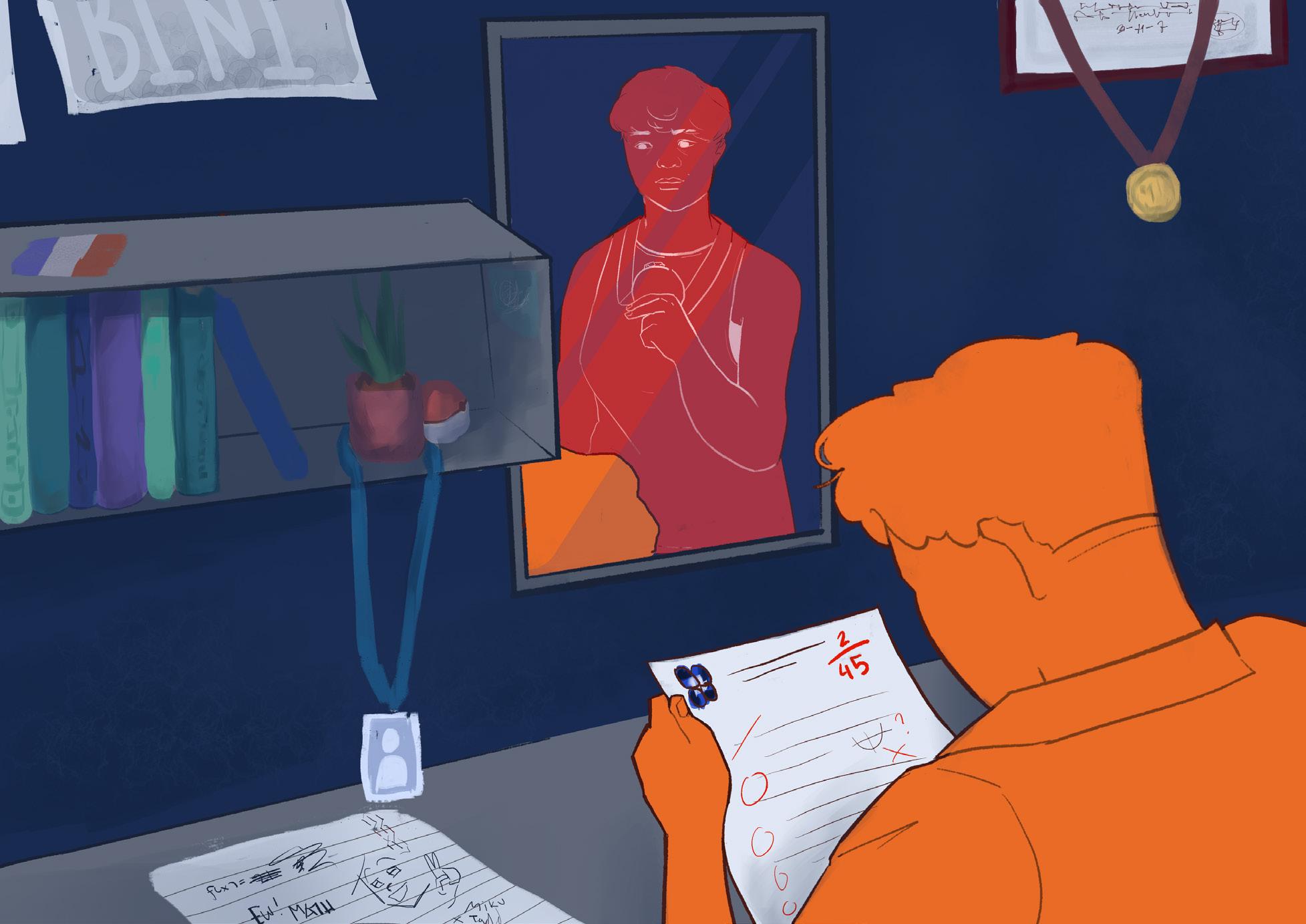

From the playful sparring sessions with her brother to bearing the country’s name on her back in the Olympics, Aira has always been driven by a passion for boxing. While just a few kilometers away, a young student with a little history hobby finds his passion for medicine and applies to Pisay, unknowing of the future it holds and the bravery it’d take to conquer it.
Taking deep breaths, the Filipina boxer pranced down the walkway with confidence in each bound, her name echoing throughout the stadium as she approached the ring to meet her opponent, steeling herself for what is to come. The whistle blew and the bout started. The two exchanged powerful blows going back and forth, without a moment to blink. Though, even with their all-out efforts, only one could be declared the winner. As the match concluded and the referee clasped onto both their hands, Aira’s was not the one raised in the end.
Taking deep breaths, the Pisay scholar hesitantly flipped open his laptop with eyes locked onto the clock ticking ever-closer to 7:30, his name echoing from the speaker as the teacher started to record the session’s attendance. As he braced himself for yet another week’s classes under lockdown, that distinctive ping and the appearance of that all-toofamiliar hook graphic signified that the weekend couldn’t have gone by any quicker.
He was now a 12th grader, and despite it being his graduating year, he felt far from ready. Often, he would find himself doing anything, anything at all, but listening to the droning discussions on Meet. Even getting out of bed in the morning to start the day felt like a chore. The stress, the schoolwork, and his dog’s passing were just too much for one teenage student stuck at home to handle. It was as if the scholarly flame in him had been reduced to a mere sputter.
“Not winning the gold was a blessing in disguise.”
Despite having lost her ticket to the gold-medal match in the Olympics, no defeat could deter the boxer’s unwavering commitment and passion for the sport she oh-so loved. The layered medallion glinting in the spotlight alongside her bright smile, while not the ultimate prize, served as a powerful reminder of how far she’s come and what she has yet to achieve.
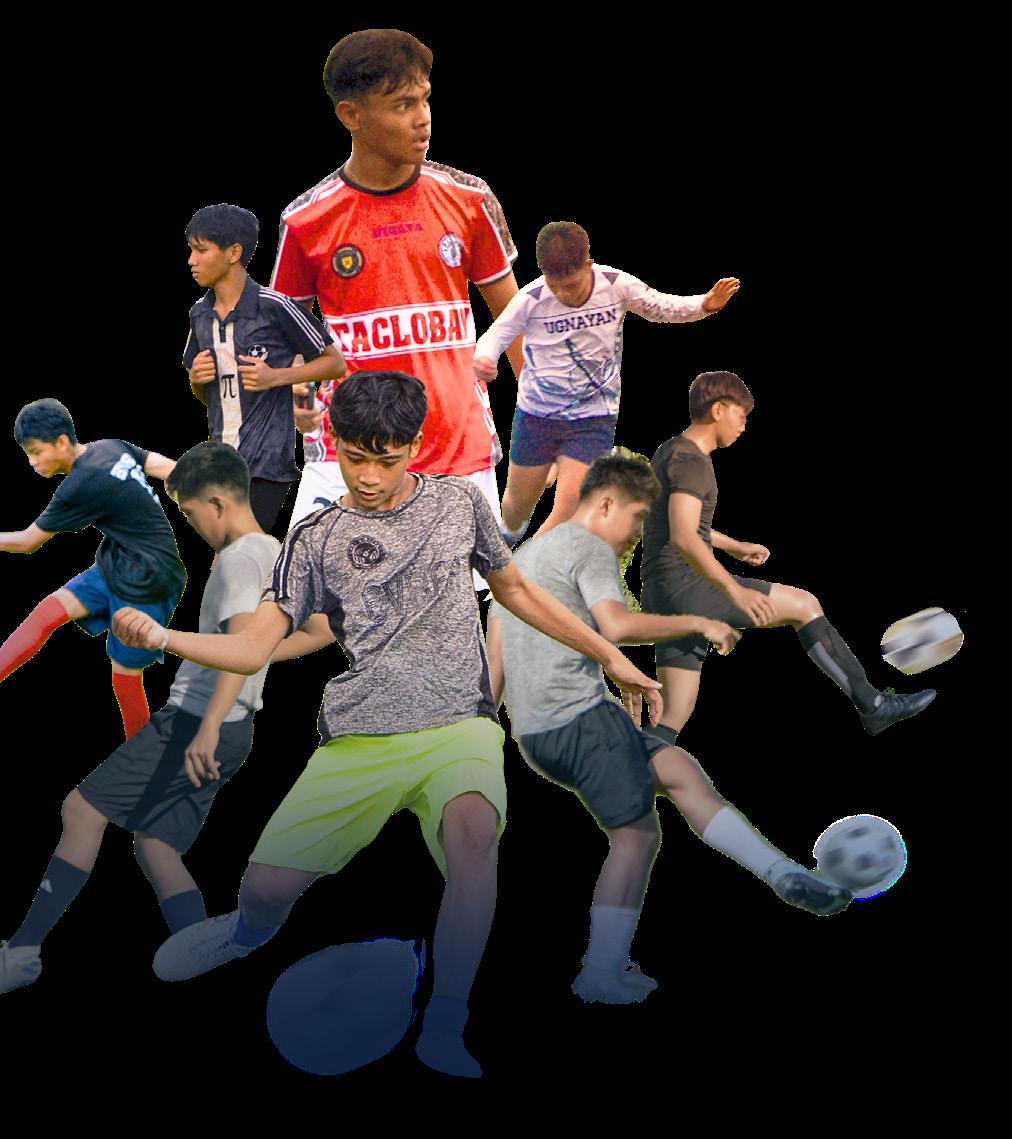

Despite having lost his academic ferver which got him throughout the crests and troughs of 11th grade, after minutes turned to hours turned to days and even months, the student got up. He simply knew that he had to get the ball rolling. A return to normalcy and a good talk with his friends were just what he needed to keep himself sane. Even though he hadn’t quite fully put himself back together, he was graduating, and the scholar needed to make every waking moment of that year count. He had already gone through so much and college was barrelling towards him no matter what he chose. No way he’d let himself stop now.
“Seeing my brother’s trophies and knowing he became a scholar without needing our parents’ support inspired me to achieve the same.”
She was only nine when she first fell in love with the sport. Her brother, who brought her behind the
curtains and showed her a whole new world, lit an inferno within her, and along with her family, served as her support system throughout her years in a career many see as hopeless. Knowing her family always had her back, and with a few matches up her sleeve, she slowly but surely worked her way up the boxing ladder from her quaint barangay all the way to the very pinnacle of competition. With all that she built up for herself alongside the family which brought her to this point, Aira knew that boxing was not just her hobby, not just an ordinary passion, but her purpose in life.
He was in 11th grade when he first fell in love with MUN. His mentors in Model United Nations, who took his passion for history and diplomacy and enlightened him with experiences and fun which he could only have dreamt of, lit a fuse destined to explode, and along with his friends, served as his support system throughout his graduating year which he found to be hopeless. After each argument over trade, each resolution passed, and each improvised speech, with all the late-night Discord calls with his friends, he had found his passion and eventually regained his purpose.
“The goal is to get that gold.”
Taking deep breaths, Aira stepped up the podium with confidence, her name echoing throughout each voice cheering for her. The bronze medal clutched in her hand reminding her of the story which brought her here. Her family was watching her from home, some even from the sidelines, and with them she had discovered who she was and got through each tough loss through them.

Taking deep breaths, the Pisay student stepped up the stage with pride, his name echoing throughout the gym listing out all that he had accomplished. The diploma clutched in his hand reminding him of the story which brought him here. His friends were just below, in their own togas, watching him wrap up his time in Pisay, and with them he had discovered more of who he was and got through each hardship of the year with them.
“It’s really okay to feel like you lack something.”
Through their tough times, whether it was Aira facing defeat in an Olympic match or the scholar grappling with a loss of motivation, the passion they find with their family and friends brings new light into their lives which previously wasn’t there.
The olympian and the scholar lead different lives. Tell different tales. Look forward to different hopes. Yet, even if their flame flickered and seemed to wane, through their own tenacity and the support they sought from those around them, the two eventually found their passion and rediscovered their light – a fire that would never burn out.


PNAGlenn Morga dominated in three categories, winning the Individual Blitz, Individual Standard, and Team Standard events at the Leyte Provincial Meet 2024, securing his spot for the 2025 EVRAA.
Morga played a grueling 2-hour-long final match, where he found himself in a drawn position but managed to secure the win after 40 moves, earning his ticket to the EVRAA 2025.
The Palarong Pambansang 6th placer reflected on his EVRAA 2023 victory, saying, “It was very hard to get to Palaro because my opponents in EVRAA were experienced and talented players, and I also want to do it again.”
In 2023, Morga competed in the Philippine National Amateurs, finishing 6th, and then came back stronger for the Batang Pinoy 2023, where he placed 4th, just shy of the podium.
With the guidance of trainer Rolly Parondo Jr. and Jo Mooney, Morga is inching ever so close to his goal of reaching the Grand Master title and becoming a Palarong Pambansa champion.
“I need to build my confidence and believe in my skill enough that I don’t doubt myself too much,” Morga shared. “I want to train against those who are stronger than me, adapt to their styles, and eventually surpass them.”
The chess prodigy emphasized that while his ultimate goal is to become a famous and feared Grandmaster or
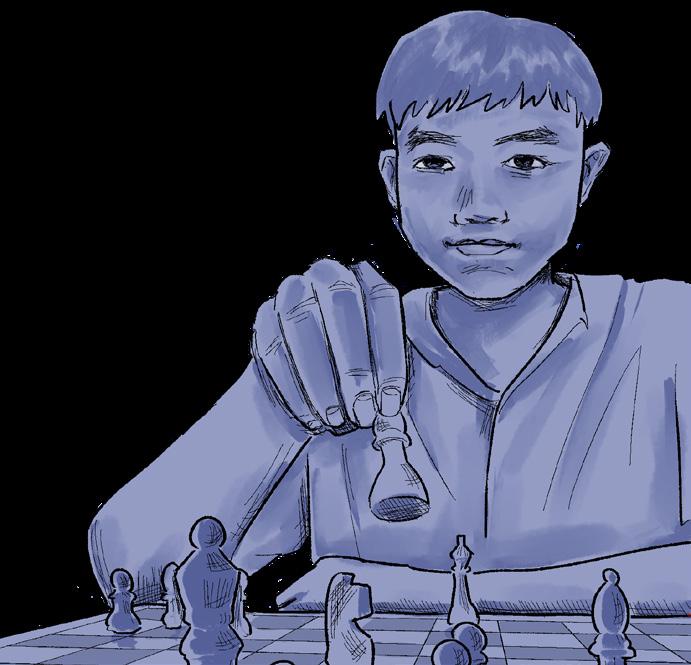













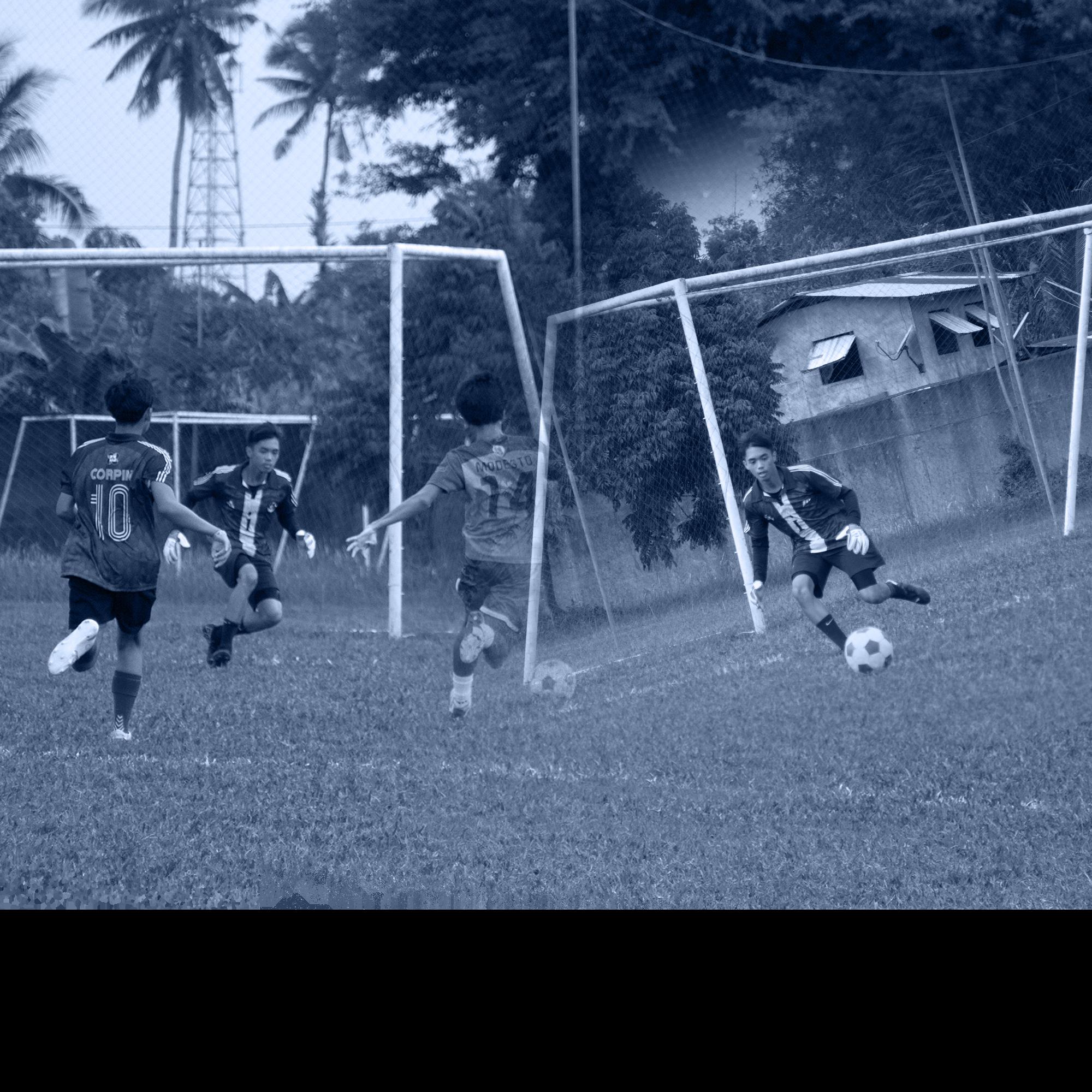





ith struggle in every breath and desperation in every step, they tried to make one final effort to retrieve the ball and hold out for a miracle of their own.
Ring! Ring! Ring!
The first bell echoed through the halls of the campus while packs of rapid footsteps rushed to their classrooms. Many of them carried two bags: one filled with notes, and the other with gear. Burdened by the crushing weight of academic responsibilities, they unpacked their belongings from one bag while mentally preparing themselves for the day ahead.
Period after period, they remained ever anxious for the sound that would signal their release. Then, it finally came, the familiar sound that promised freedom. With a single ring of a bell, they sprung to life while hurriedly sprinting to the field with their second bag in tow—sun shining and wind brushing through their hair.
The halls were eventually left empty and rooms fell silent – but the football field remained as lively as ever. The wind howled across the field, carrying the sound of
the game, only interrupted by occasional shouts from the sidelines. Cleats dug into the grass as players ran across the field, kicking up dirt along the way.
They were merely a bunch of Pisay scholars, and yet, each one of them had a spark deep inside of them – a fierce desire to bring honor to their school while doing what they loved the most, a sport to rival all sports, football. That spark would then set fire to a blaze that would spread across the school engulfing its entirety in an interest unmatched. As each new person caught wind of this, other scholars sharing the same fiery passion were drawn in, each one lending their own flame to the ever-increasing firestorm. Without any elder to light their way in their journey, they realized the only way to soar above the clouds was to grow their own wings and teach themselves to fly. Together, they had formed a flock, one with shared dreams, unyielding
determination, and most important, a united love for one thing, football. Every time they entered the pitch, they trained themselves to grow in both body, mind, and spirit – the field had finally become their home.
Two months of training with muddy cleats and torn jerseys passed by in a flash. Yet suddenly, the days of gung ho training and simple lessons came to a stop.
An invitation to compete in the annual Bethel’s Cup presented itself to them—this was an opportunity they couldn’t afford to let slip away. The outside world was blissfully unaware as to who the team was yet, and so, they wouldn’t know what hit ‘em. With this, a flame of ambition ignited within them as their eyes were set on the prize—bringing home the gold and making a name for themselves on the field.

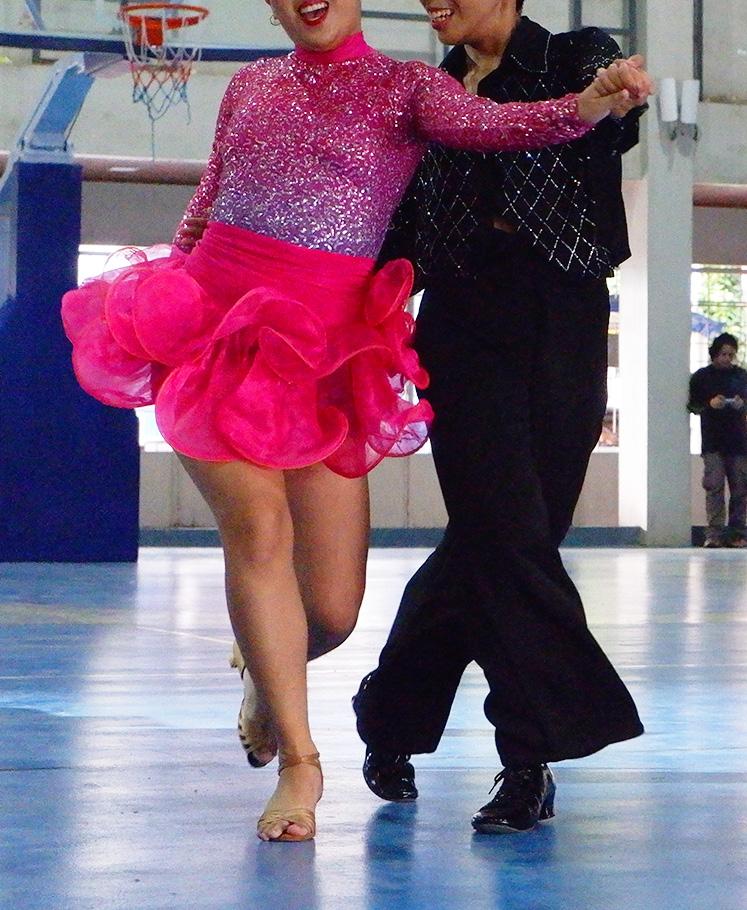


NEARLYN LUMAYNO
“You’ll


